
Himaad
Transforming Home Healthcare with Modern Mobile Solution
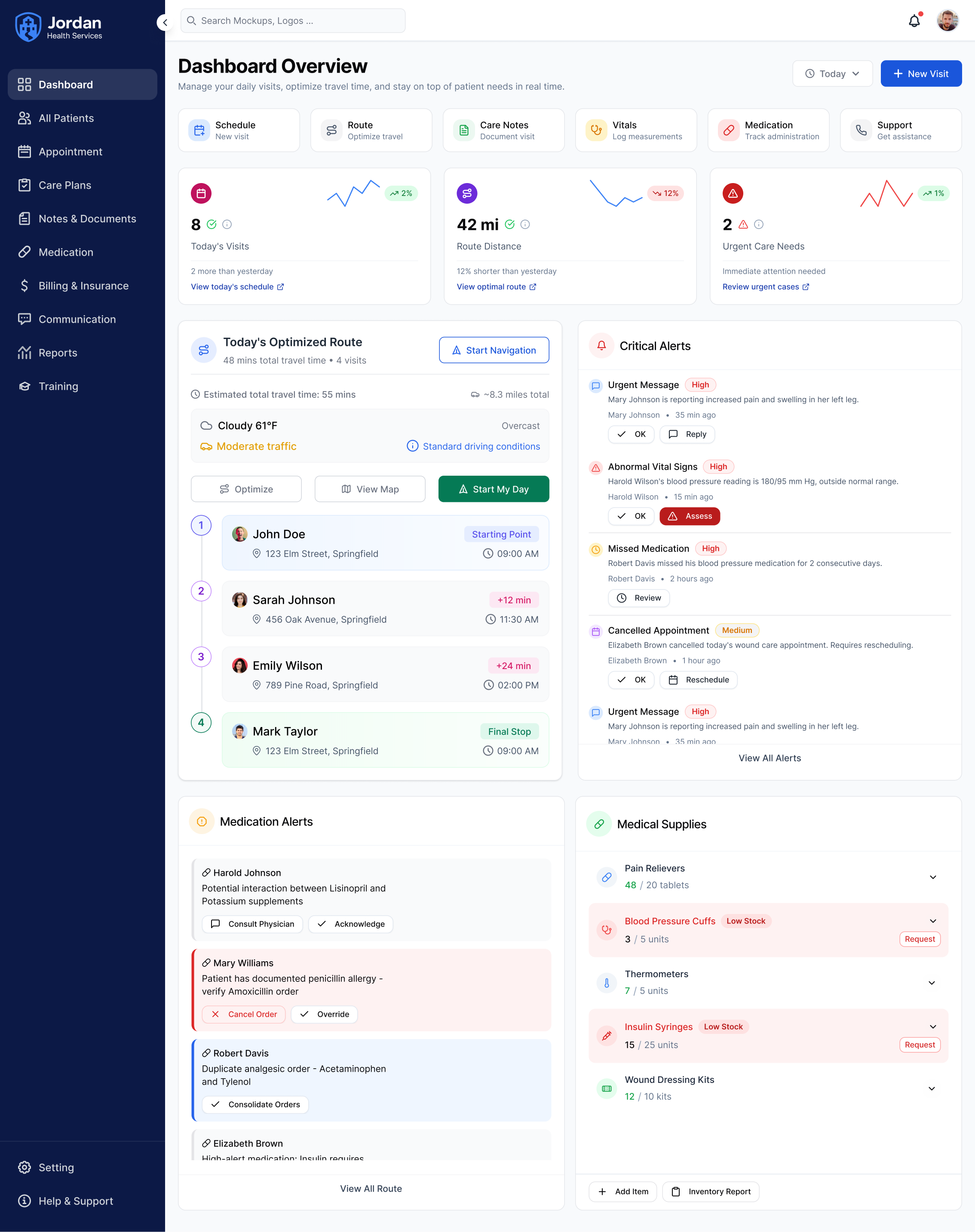
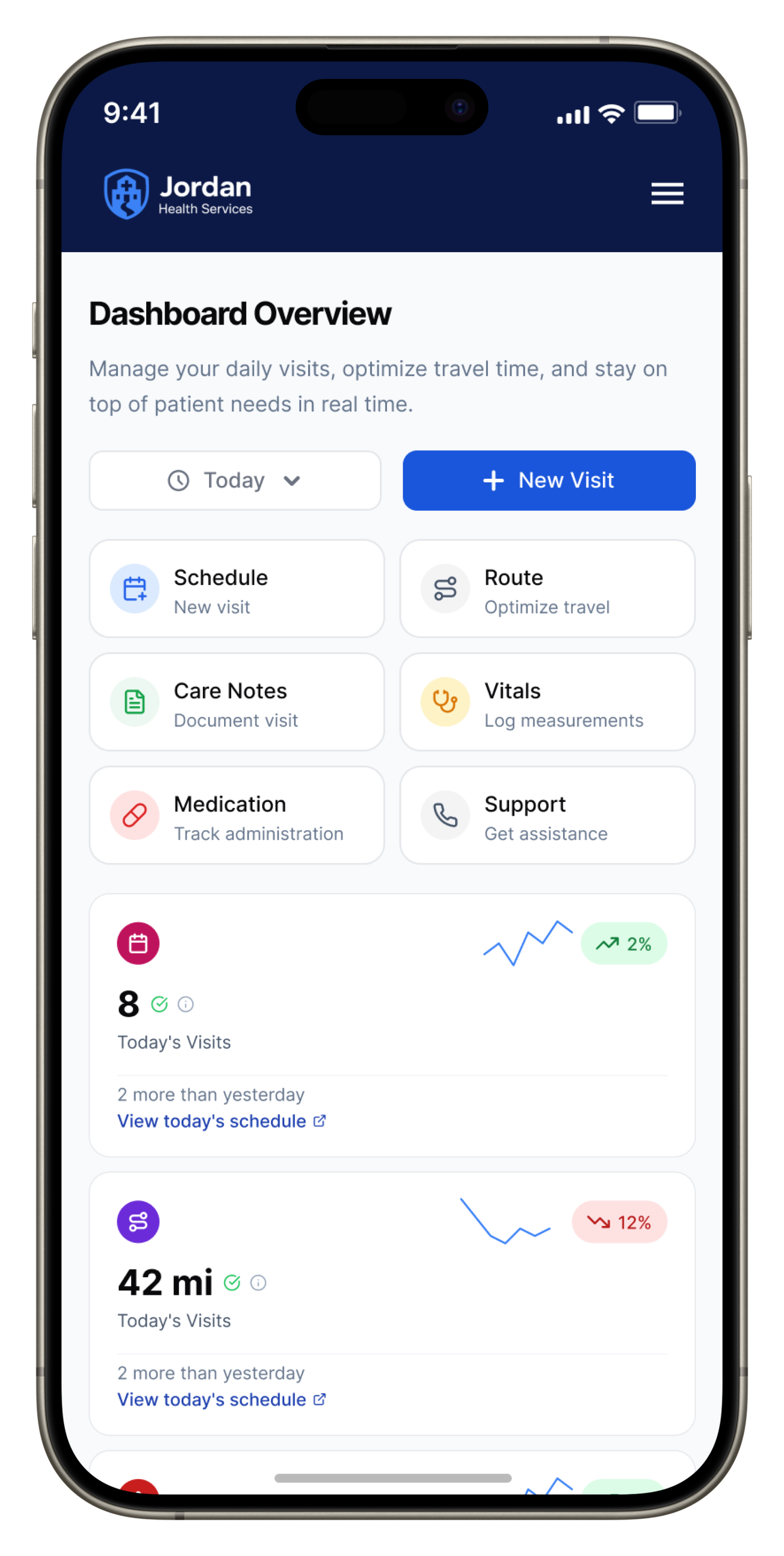
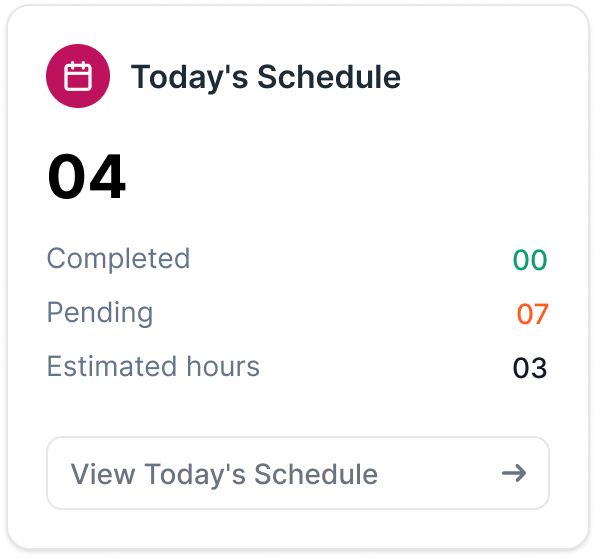
Project Overview
Jordan Health Services (JHS) is a provider of home healthcare solutions serving thousands of patients across multiple regions. Their legacy software—used by nurses to document visits and manage patient data—was becoming a barrier to effective care.
The goal was to create a cohesive platform that unified all critical tasks, offered offline support, reduced errors, and introduced new features to enhance patient care and staff satisfaction.
Team Size
+ 8 people
Role
UX Designer & Researcher
Duration
+ 9 Months
Business Type
B2B
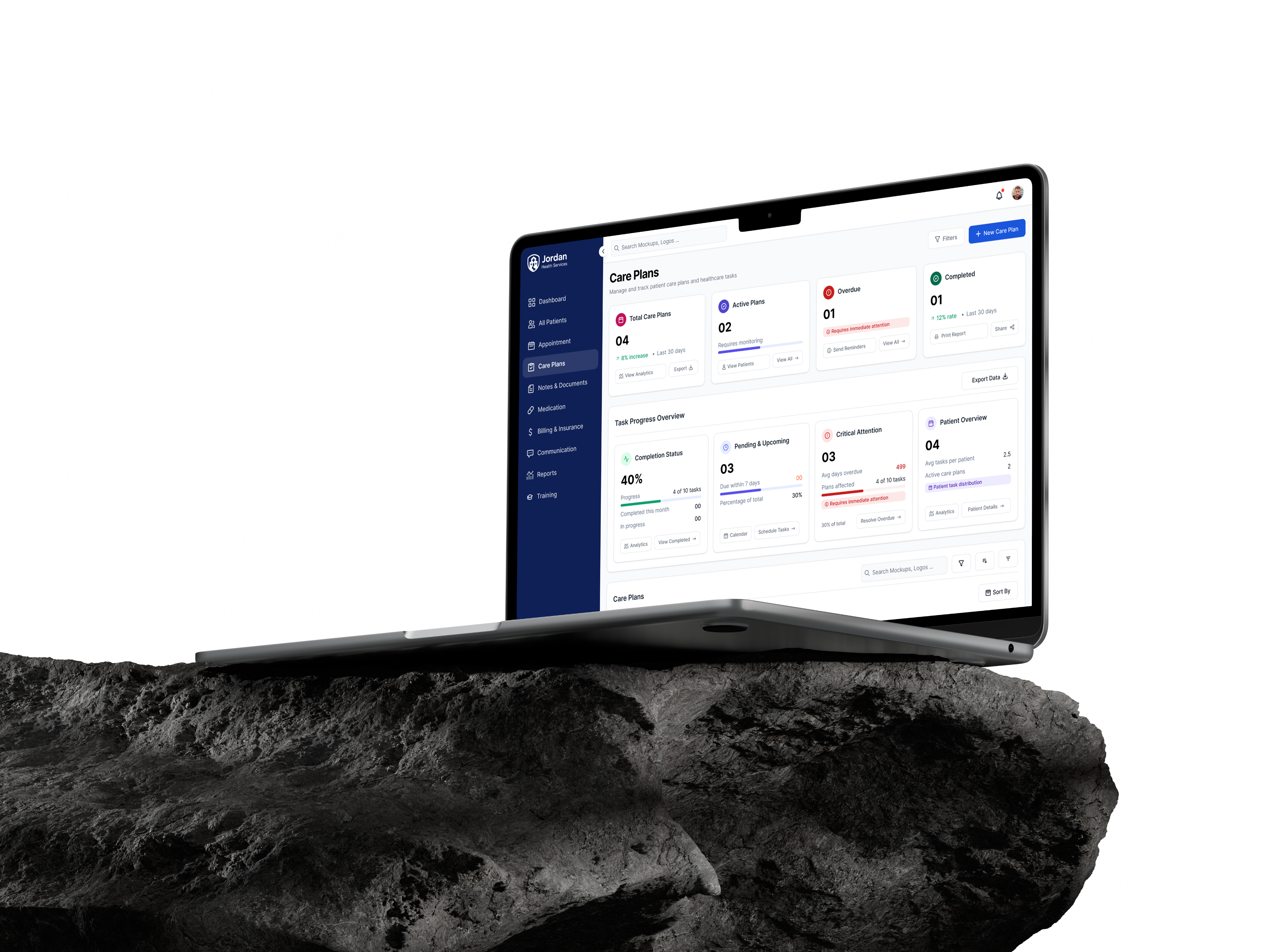
Care Solution
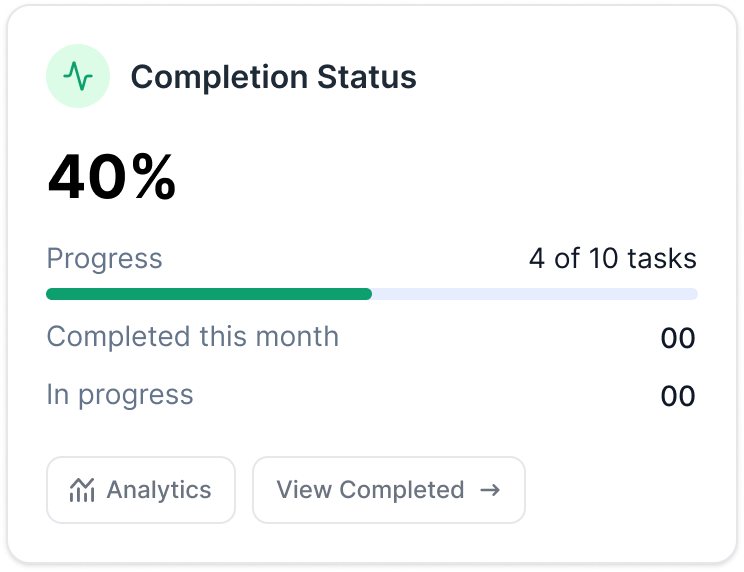
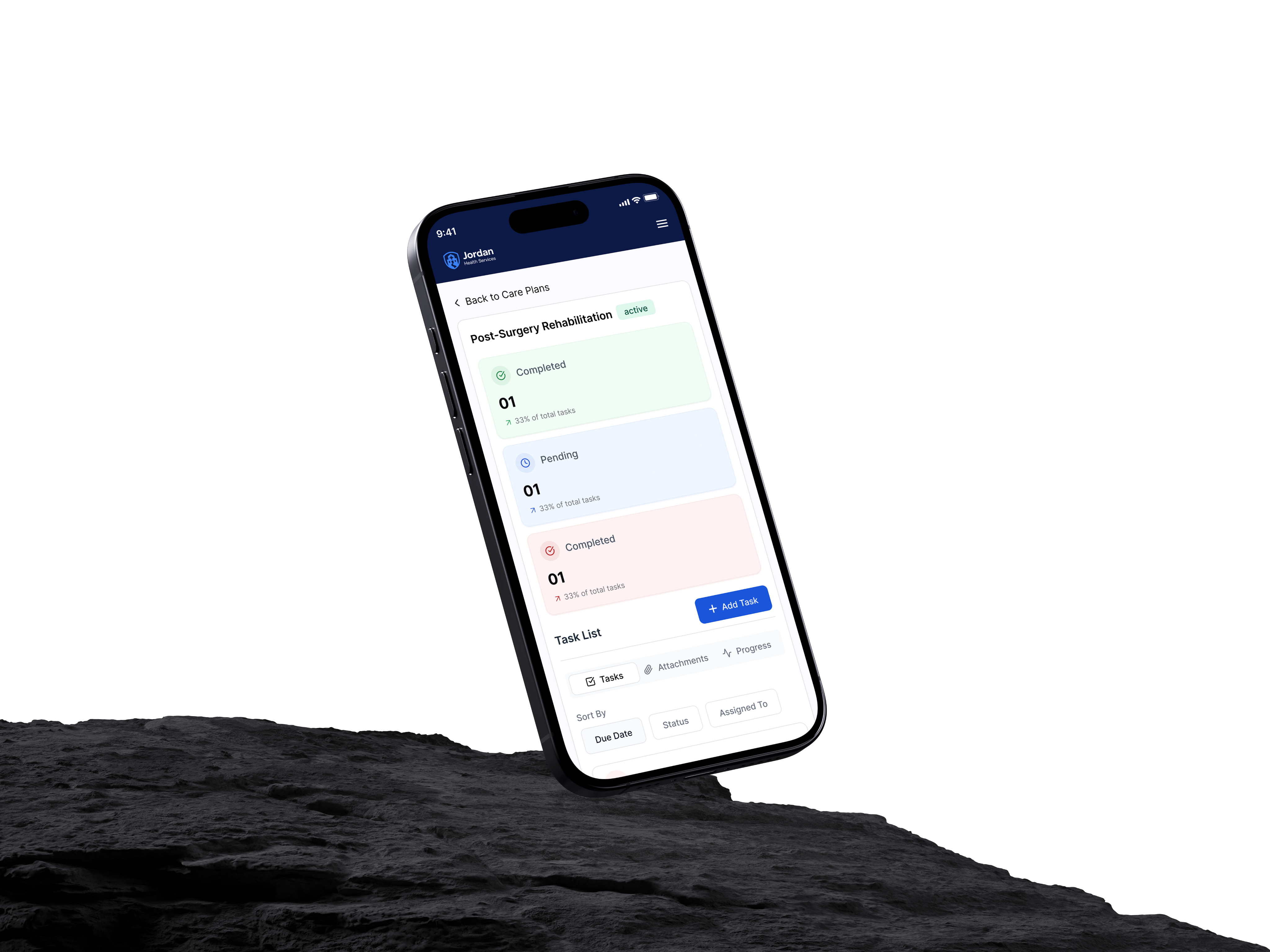
Management
Outcome
Jordan Healthcare 1.0 (the original release) provided basic schedulin gand documentation but suffered from serious limitations during field use. The app didn't adequately address caregivers' needs for reliable offline functionality.

Redesign Impact
UX Design
UI Design
Offline Success Rate
96%
Design & Development Process
Our process focused on transforming a legacy system into an intuitive, offline-capable platform that serves diverse healthcare roles.

October 2024
Research & Discovery
Conducted user interviews, field observations, and workflow analysis with healthcare staff to understand pain points.
November 2024
Analysis & Persona Development
Analyzed research data, created user personas, and developed journey maps to identify key opportunity areas.
December 2024
Design Concepts & Low-Fidelity Prototypes
Created wireframes and low-fidelity prototypes for each user role, focusing on offline-first architecture.
January 2025
User Testing & Feedback
Conducted usability testing sessions with nurses, managers, and family caregivers to validate initial designs.
February 2025
High-Fidelity Design & Prototyping
Refined designs based on user feedback and developed high- fidelity prototypes with offline functionality.
March 2025
Development & Implementation
Developed the application with dedicated interfaces for each user role and robust offline synchronization.
October 2024
Beta Testing & Refinement
Conducted real-world testing with a pilot group of 25 nurses across various locations and connectivity scenarios.
May 2025
Launch & Adoption
Rolled out the solution to all 250+ staff members with comprehensive training and support resources.
Before & After Comparison
Jordan Healthcare 1.0 (the original release) provided basic schedulin gand documentation but suffered from serious limitations during field use. The app didn't adequately address caregivers' needs for reliable offline functionality.
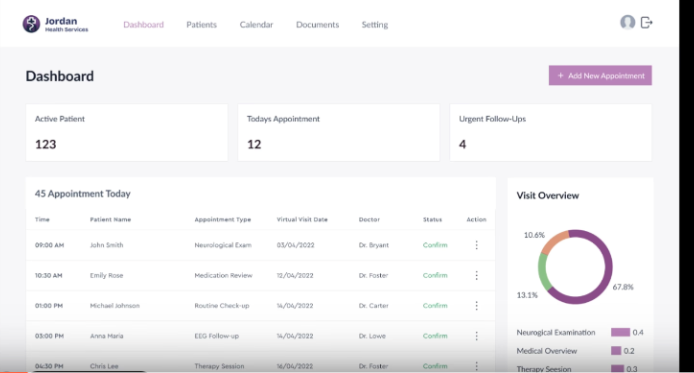
Before
Desktop-only software requiring office returns
Frequent crashes and data loss during sync
Multiple separate systems causing confusion
No offline capability for rural visits
Limited SOS or emergency functionality

After
Desktop-only software requiring office returns
Frequent crashes and data loss during sync
Multiple separate systems causing confusion
No offline capability for rural visits
Limited SOS or emergency functionality
Research Approach
To deeply understand the challenges and needs of home healthcare providers and patients, we conducted extensive research using multiple methods.
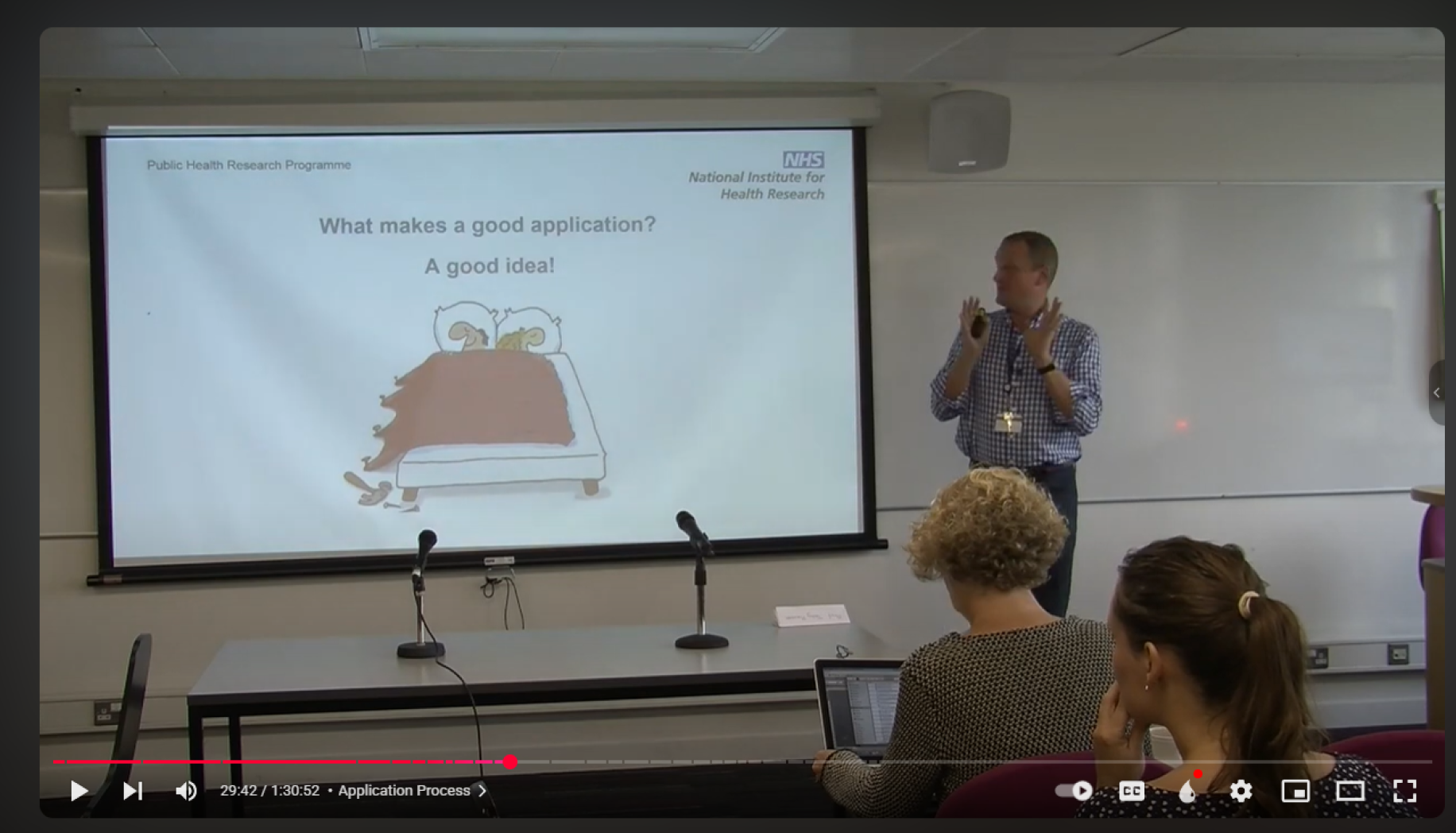
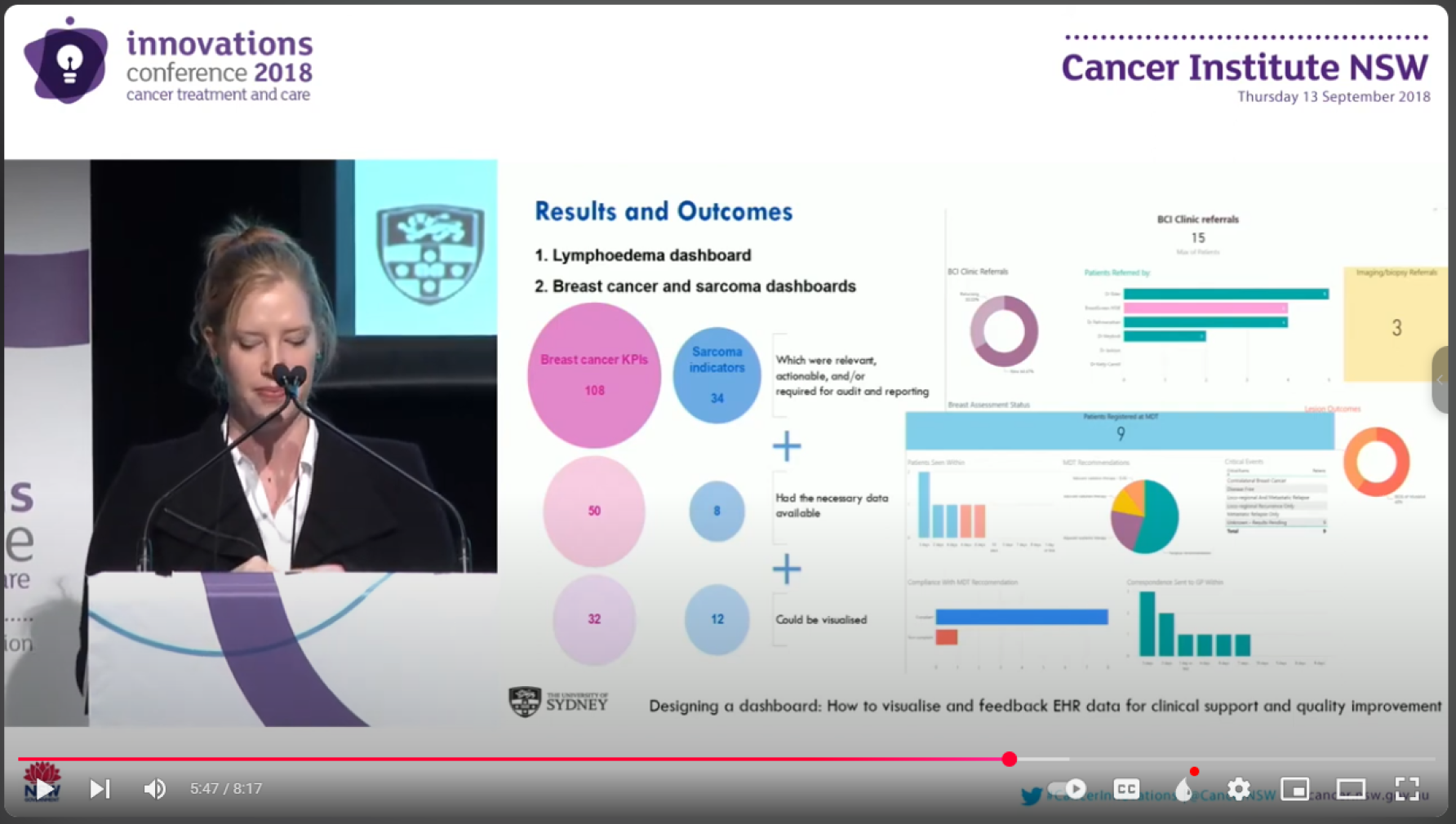
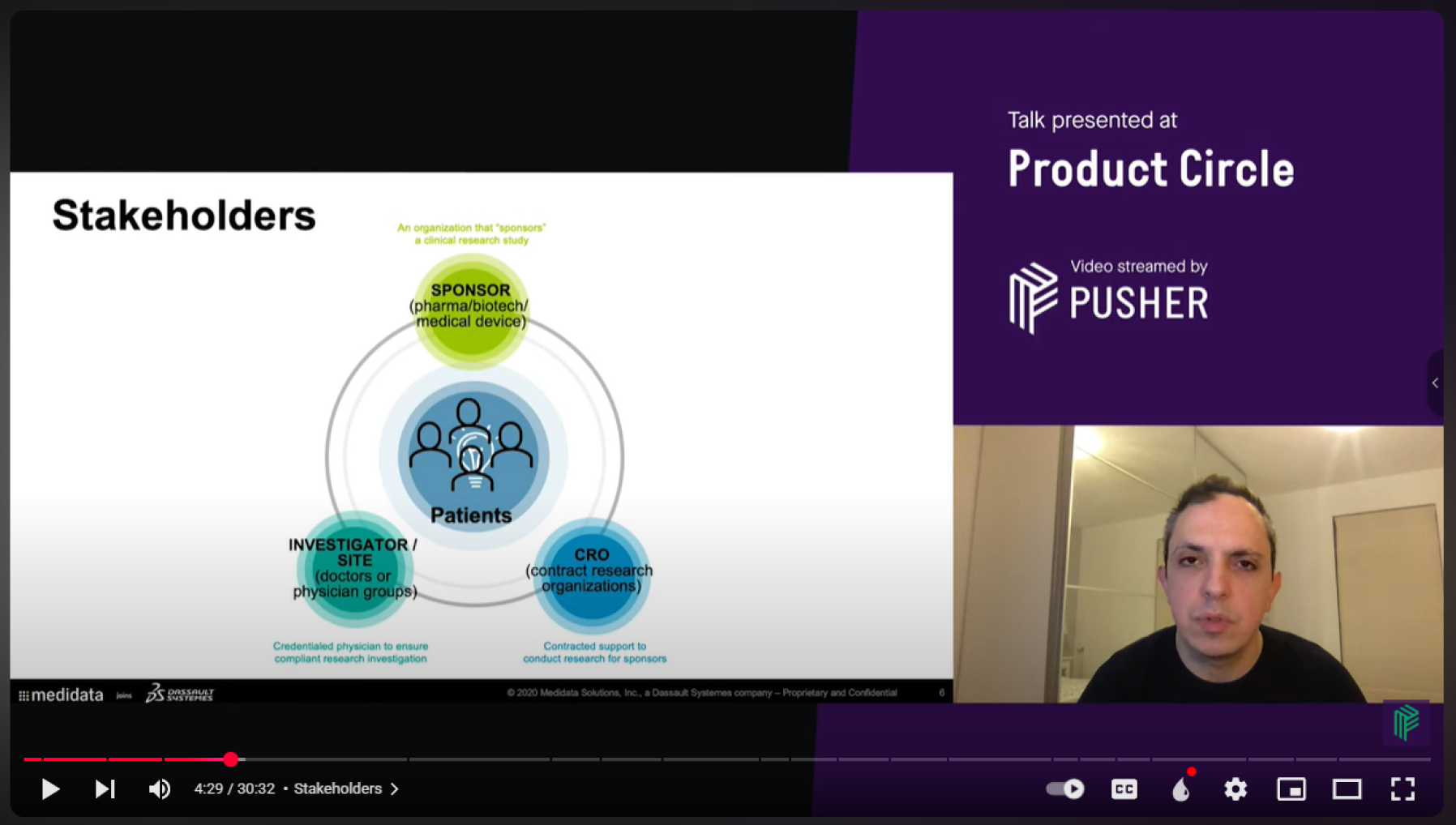
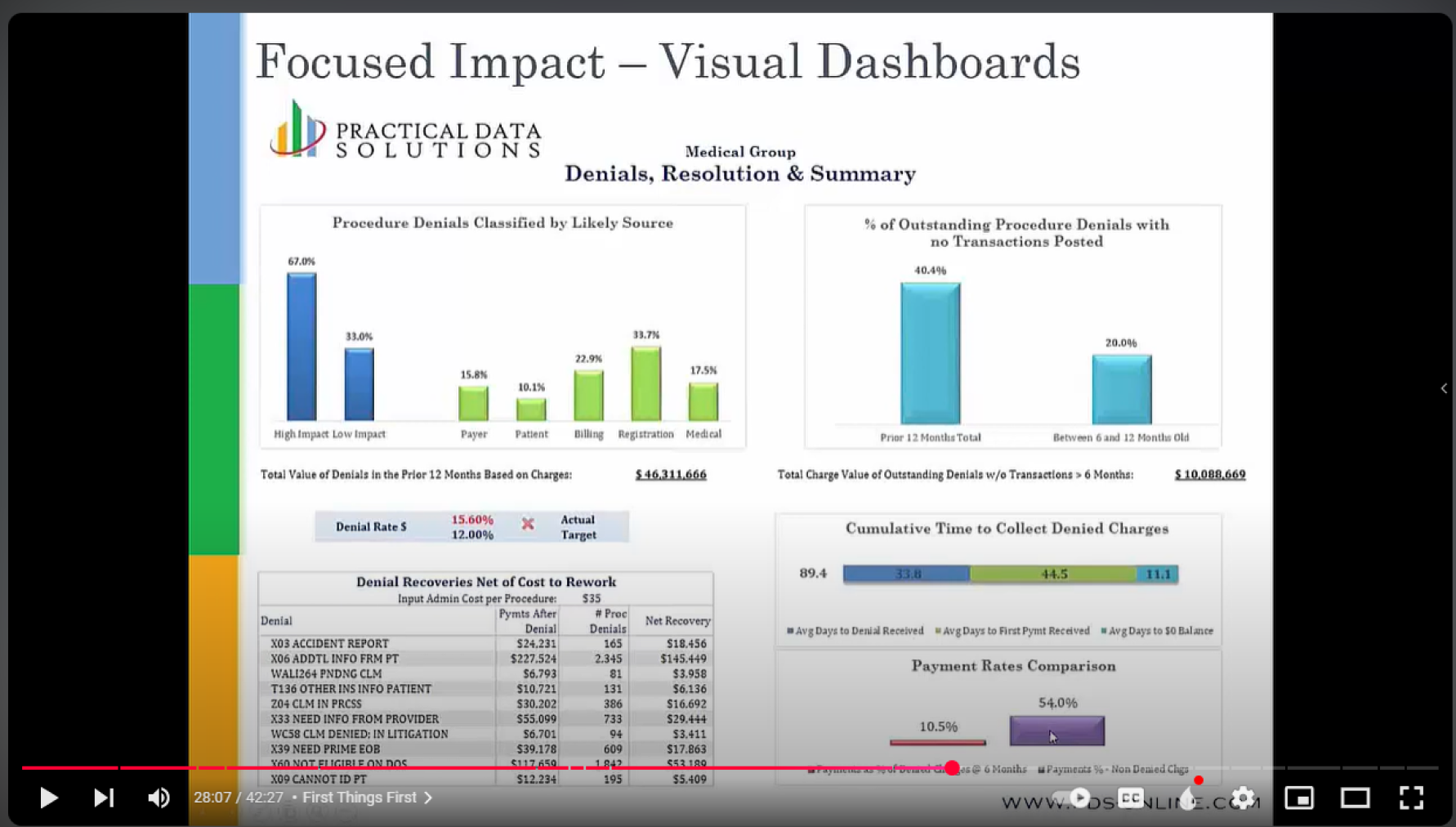
Contextual Interviews
Interviewed 18 nurses, 6 nurse managers, and 12 family caregivers to understand their experiences.
Field Observations
Shadowed 8 nurses during home visits to observe real-world usage patterns and challenges in various environments
Workflow Analysis
Mapped and analyzed 5 key workflows to identify pain points, redundancies, and improvement opportunities
User Persona
We mapped the current journey of home healthcare nurses to identify pain points and opportunities for improvement.

Traveling Nurse
Mary Rodriguez
Location: Amman, Jordan
Age: 32 Years
Experience: 8 Years
Pain Points
Struggles with manual data entry during patient visits
Often loses data due to poor connectivity in rural areas
Finds the current system fragmented and difficult to navigate
Spends too much time on documentation vs. patient care
Limited visibility into schedule changes or urgent requests
Goals
Mobile solution that allows seamless offline data capture
Quick access to patient care plans and medical history
Simplified documentation that can be completed on-the-go
Immediate emergency support when needed in the field
Optimized routes to reduce travel time between visits
Research Insights
After analyzing interview data, field observations, and workflow analysis, we identified key insights that guided our design solutions.

🟢 NEED
High
Data Access for Multiple Providers
Patients often have multiple healthcare providers who need access to the same information but use different systems.
"It's frustrating when the visiting nurse doesn't know what medication changes the doctor made yesterday."
— Theresa, Family Caregiver
🔴 PAIN POINT
High
Offline Accessibility Issues
Nurses frequently lose access to patient data when they enter areas with no cellular or WiFi coverage.
"I dread going to rural homes because I know I won't have the information I need when I get there."
— Maria, Home Health Nurse
Affinity Mapping
We mapped the current journey of home healthcare nurses to identify pain points and opportunities for improvement.
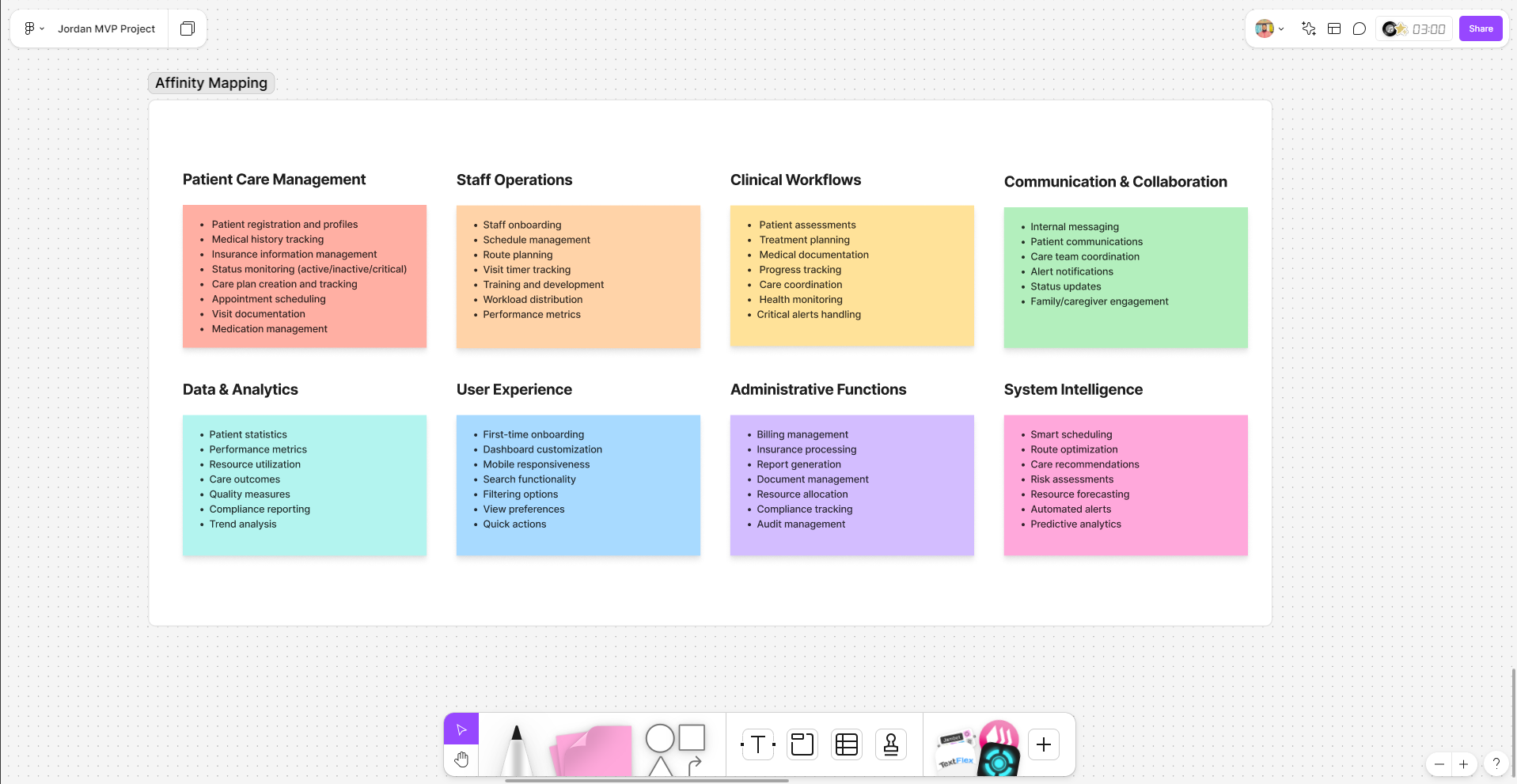
Journey Mapping
We mapped the current journey of home healthcare nurses to identify pain points and opportunities for improvement.
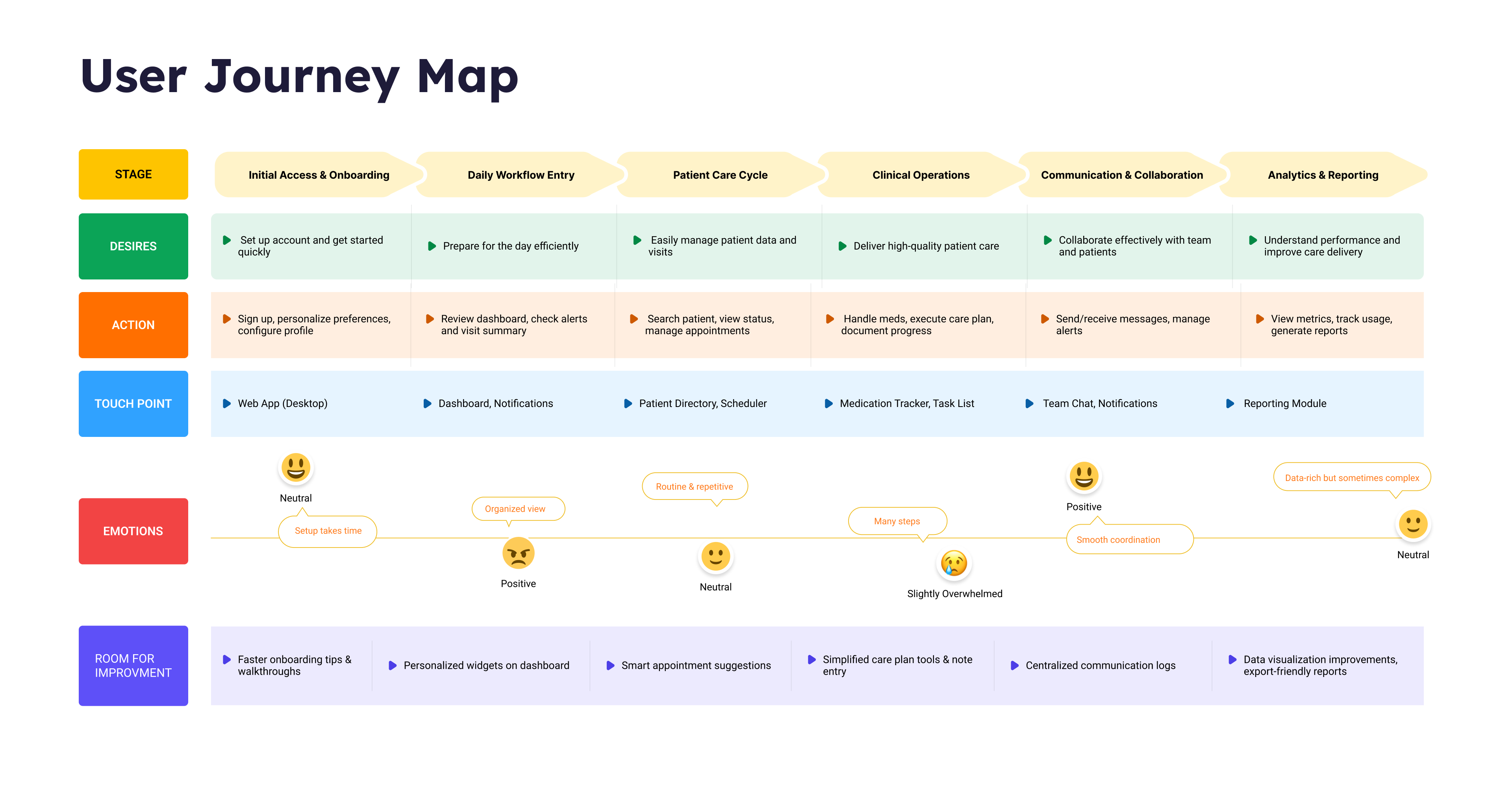
Heat mapping
We mapped the current journey of home healthcare nurses to identify pain points and opportunities for improvement.
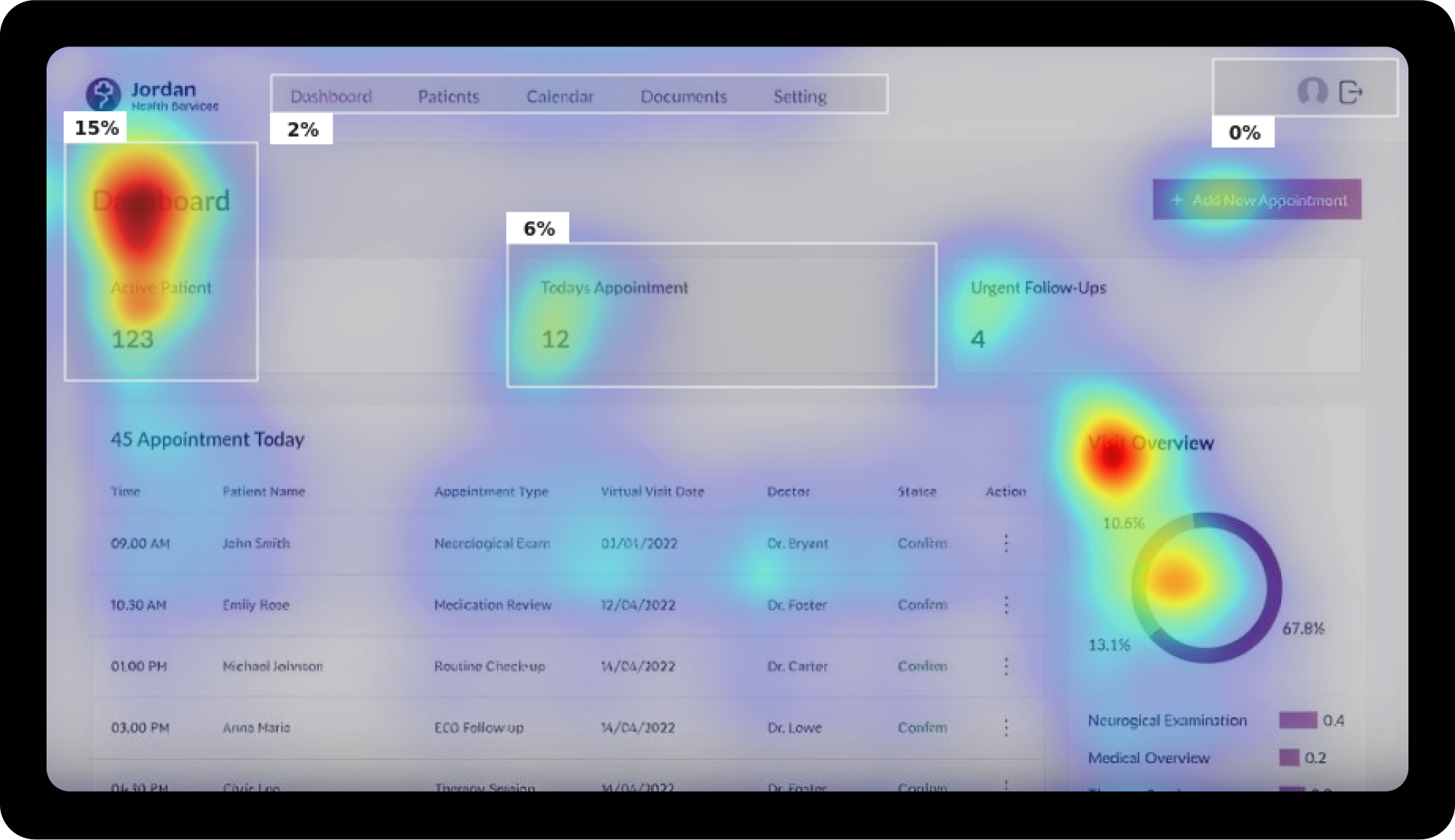
User Flow
We mapped the current journey of home healthcare nurses to identify pain points and opportunities for improvement.
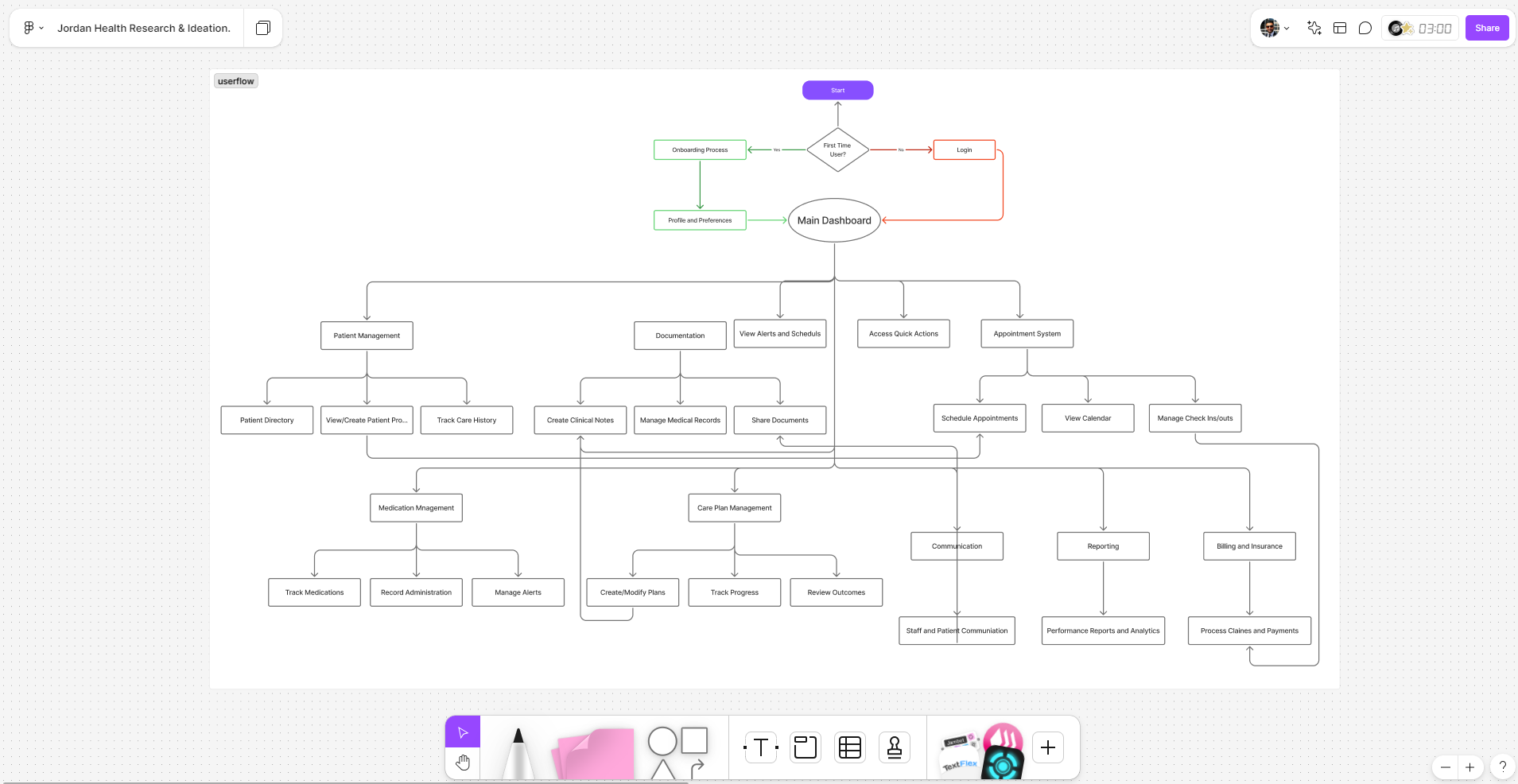
Wireframes
We mapped the current journey of home healthcare nurses to identify pain points and opportunities for improvement.
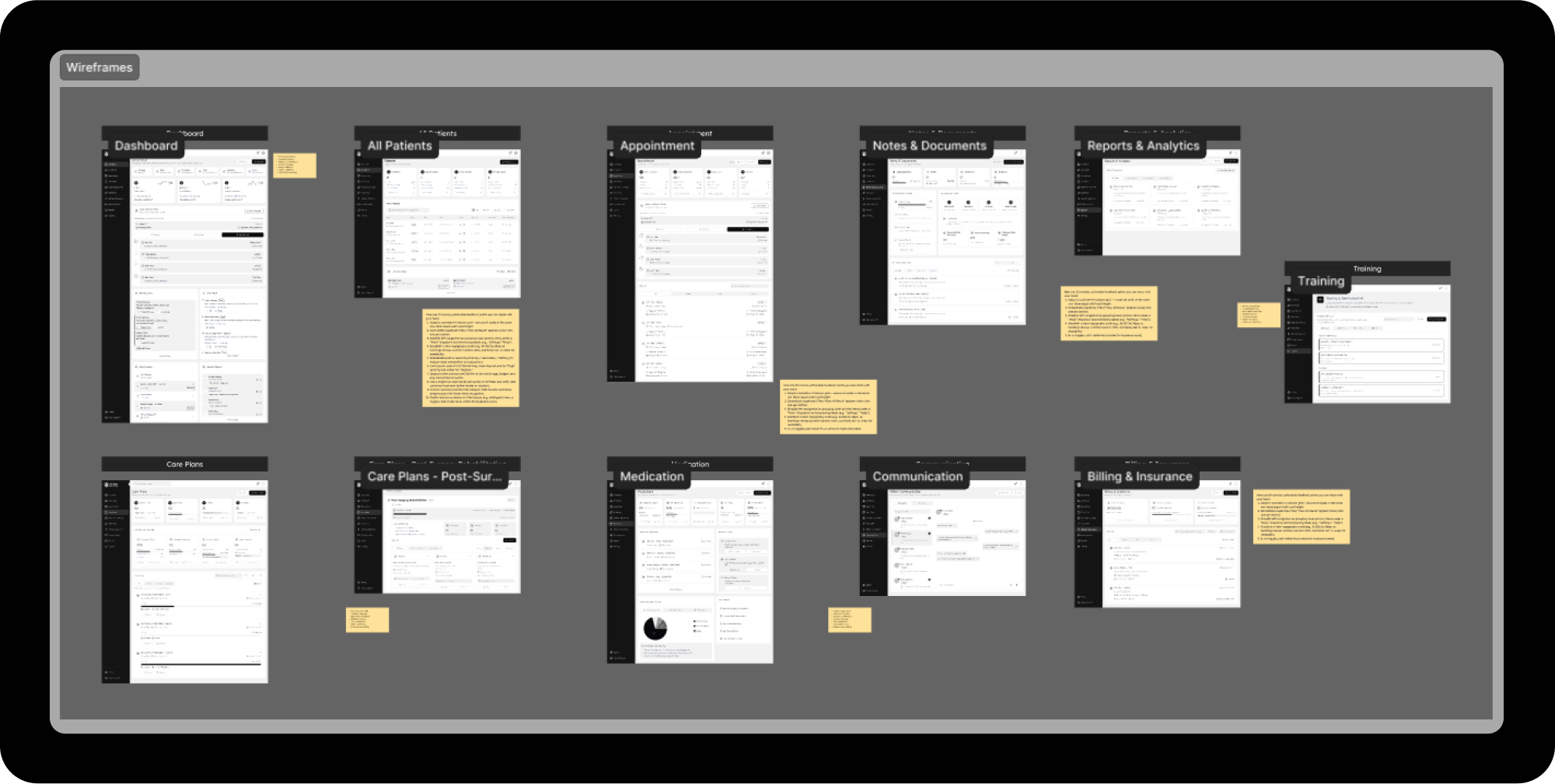
Accessibility Considerations (WCAG)
Ensuring inclusive designs by following the latest WCAG to make products usable for all.
Color Contrast
Text Legibility
Keyboard Navigation
Alternative Text
Screen Reader
Error Identification
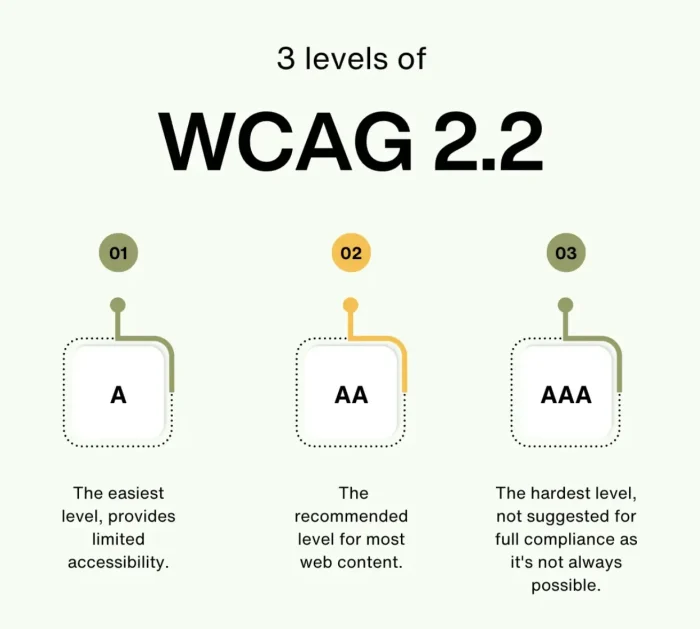
Typography & Colors
Aa
Inter
A B C D E F G H I G K L M N O P Q R S T U V W X Y Z 1 2 3 4 5 6 A B C D E F G H I G K L M N O P Q R S T U V W X Y Z 0 ~@#^*&()+_/
Regular
Medium
Semi Bold
Bold
Sapphire.
HEX: #0F2057
Dodger Blue.
HEX: #1A56DB
White.
HEX: #FFFFFF
Nocturne.
HEX: #03030F
Collaboration with Developers
To deeply understand the challenges and needs of home healthcare providers and patients, we conducted extensive research using multiple methods.
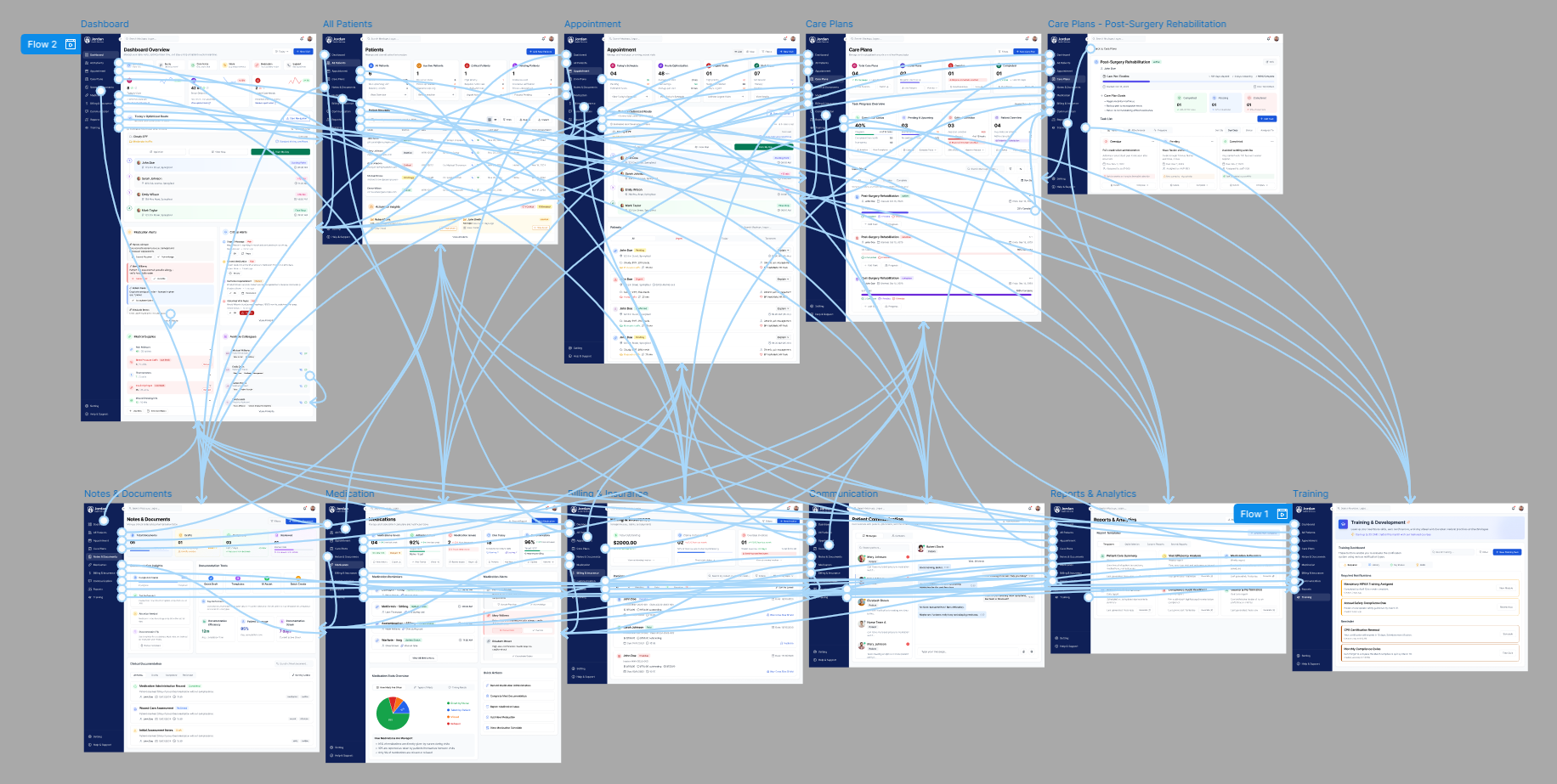
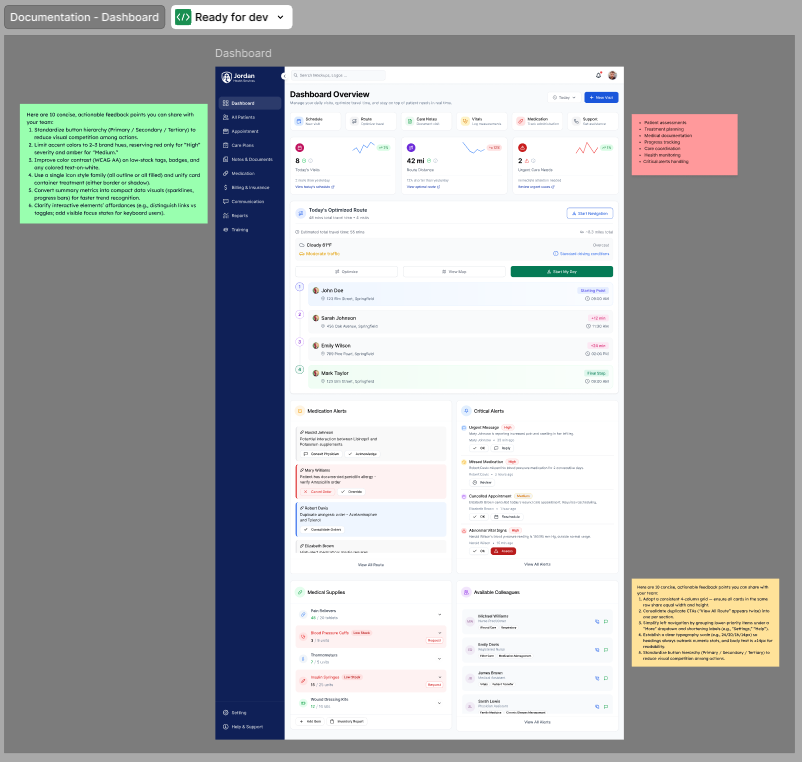

Universal Component System
A modular and reusable component set designed to power multiple screens across the healthcare platform. This system includes dynamic widgets like visit summaries, smart route optimization, patient directories, care plans, and AI-powered documentation tools—ensuring consistency, scalability, and a seamless user experience throughout the product.
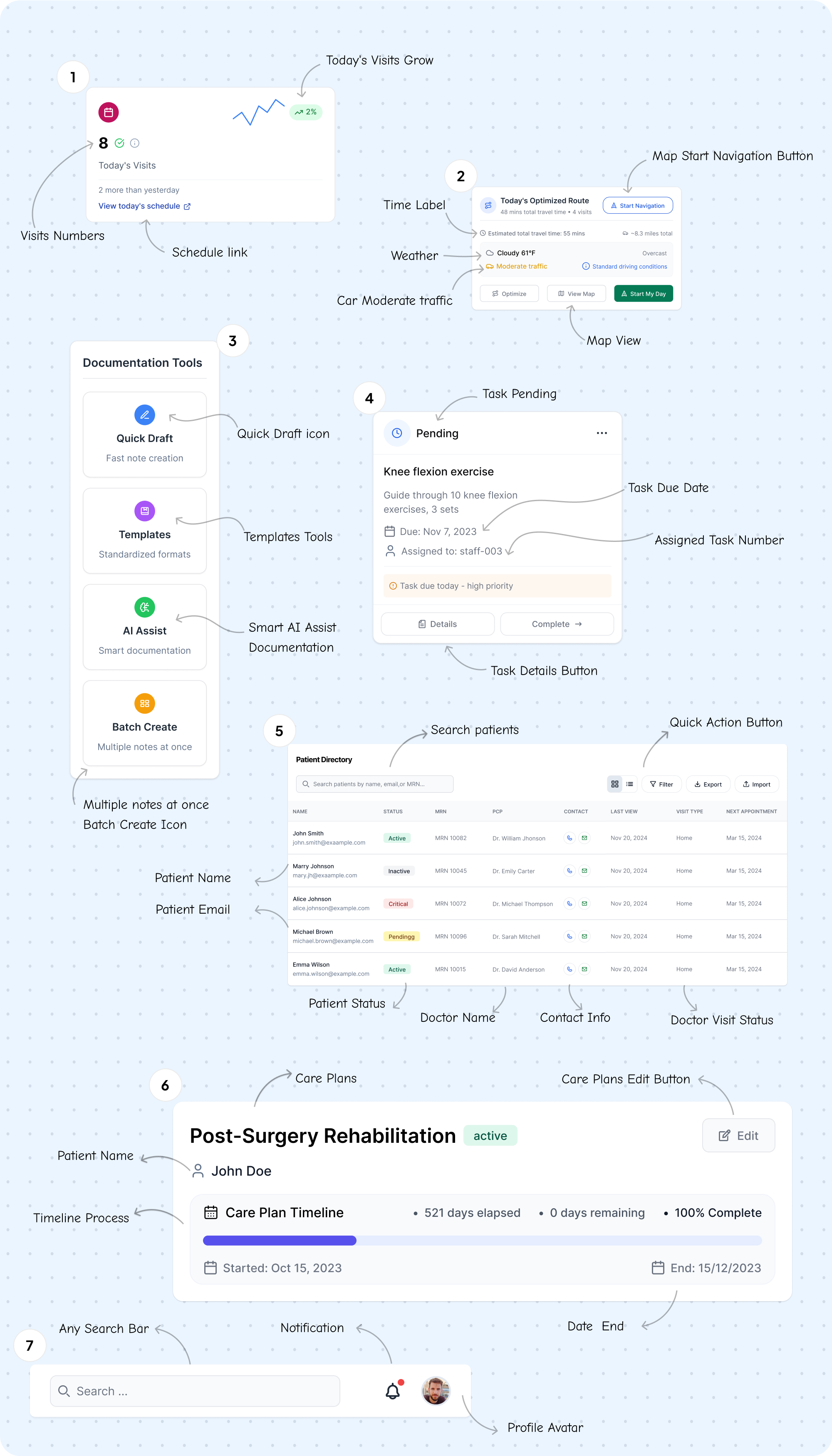
Dashboard
The new Dashboard Overview for Jordan Health Services is designed specifically for nurses and caregivers who conduct home visits. It offers a consolidated, real-time view of daily visits, route planning, patient alerts, and medication tracking—all in one accessible, responsive layout. This redesign aims to reduce cognitive load, minimize manual effort, and empower healthcare professionals with smarter tools to make informed decisions on the go.
By focusing on contextual information, efficiency-driven actions, and real-world constraints like weather, traffic, and medication alerts, the dashboard becomes a practical command center that enhances patient care and nurse productivity.
Route Optimization
Smart Start Button
Critical Alerts
Medication Actions
Supply Monitoring
Daily KPIs
Clean Layout
Mobile-First Design
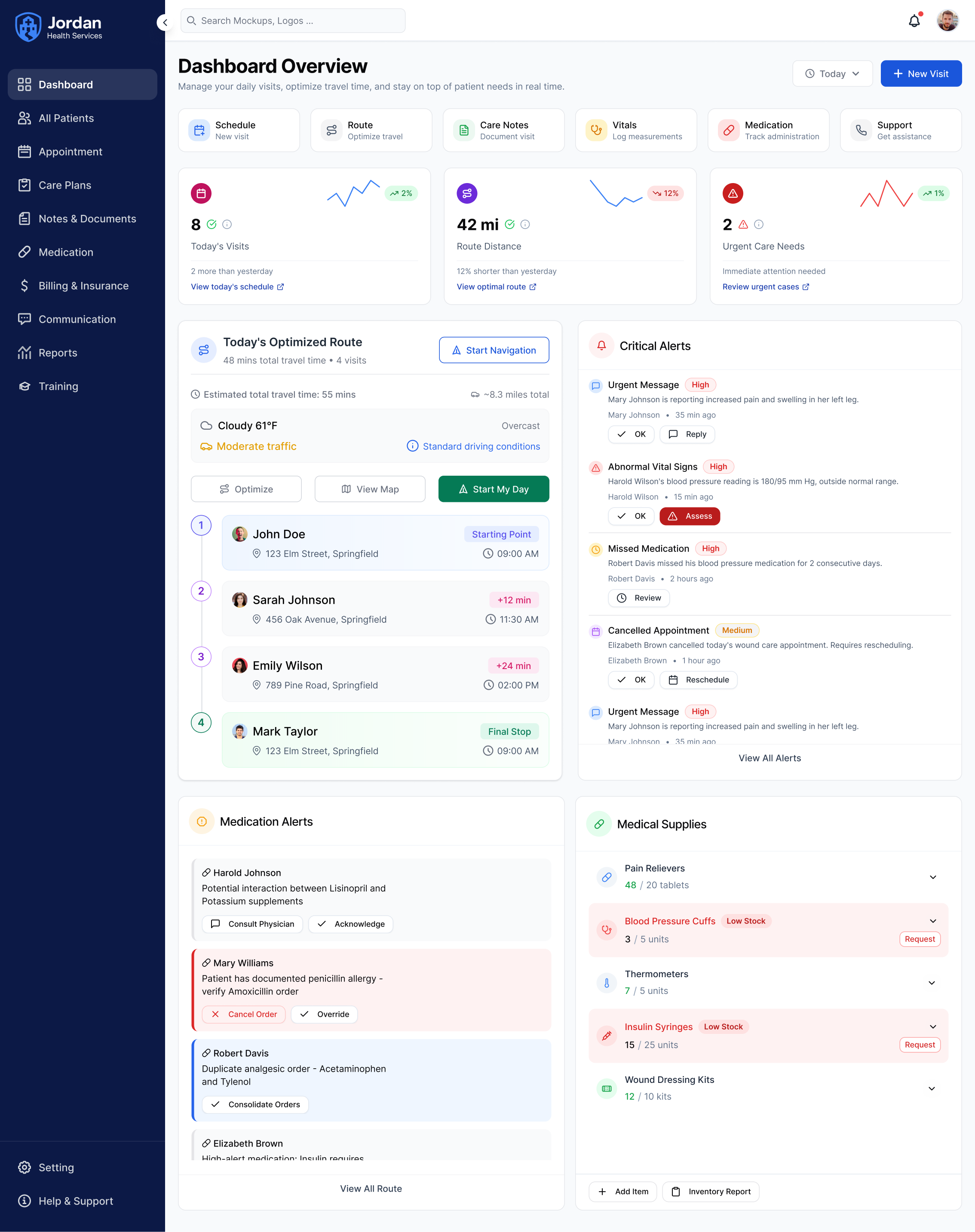

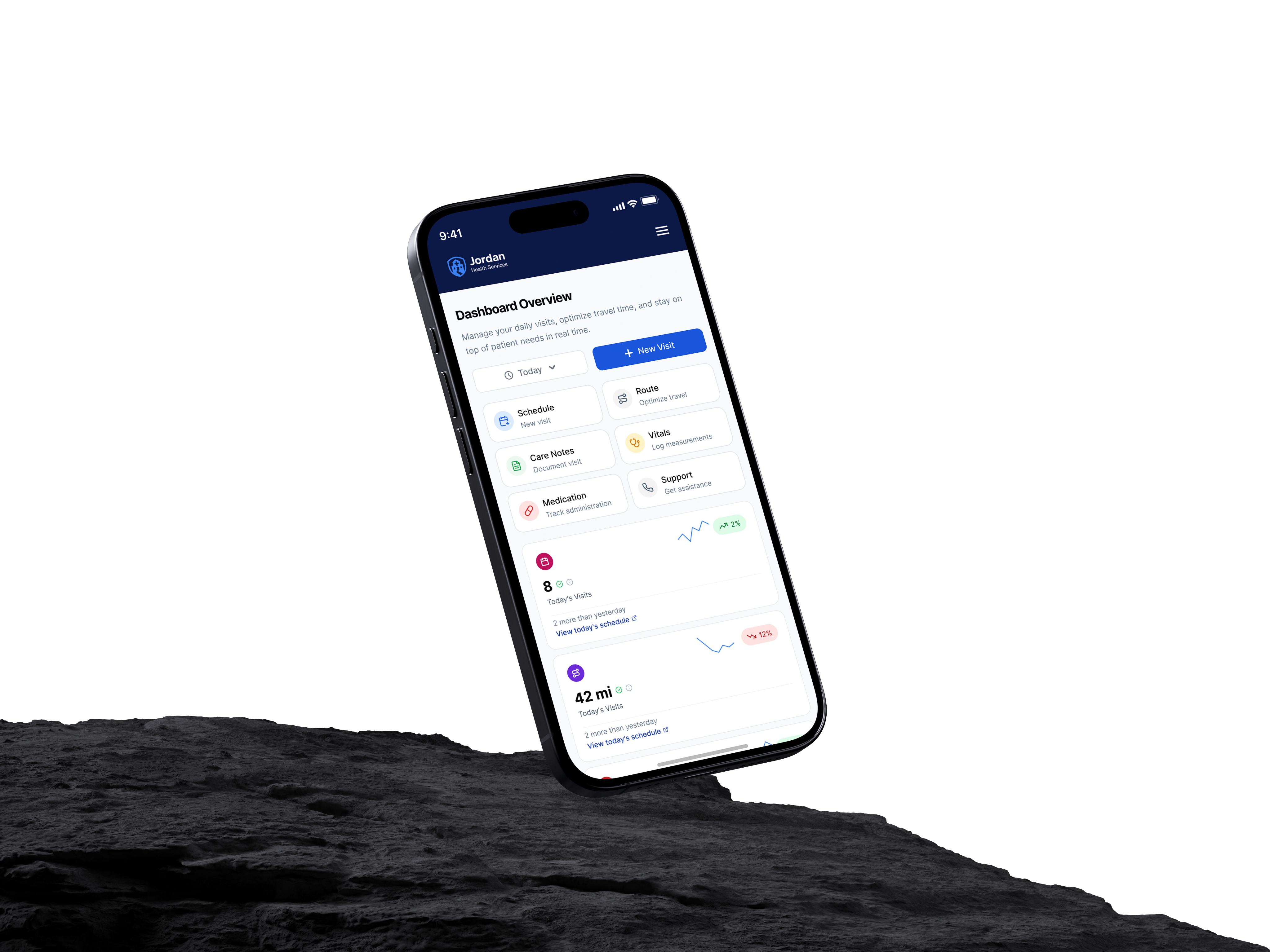

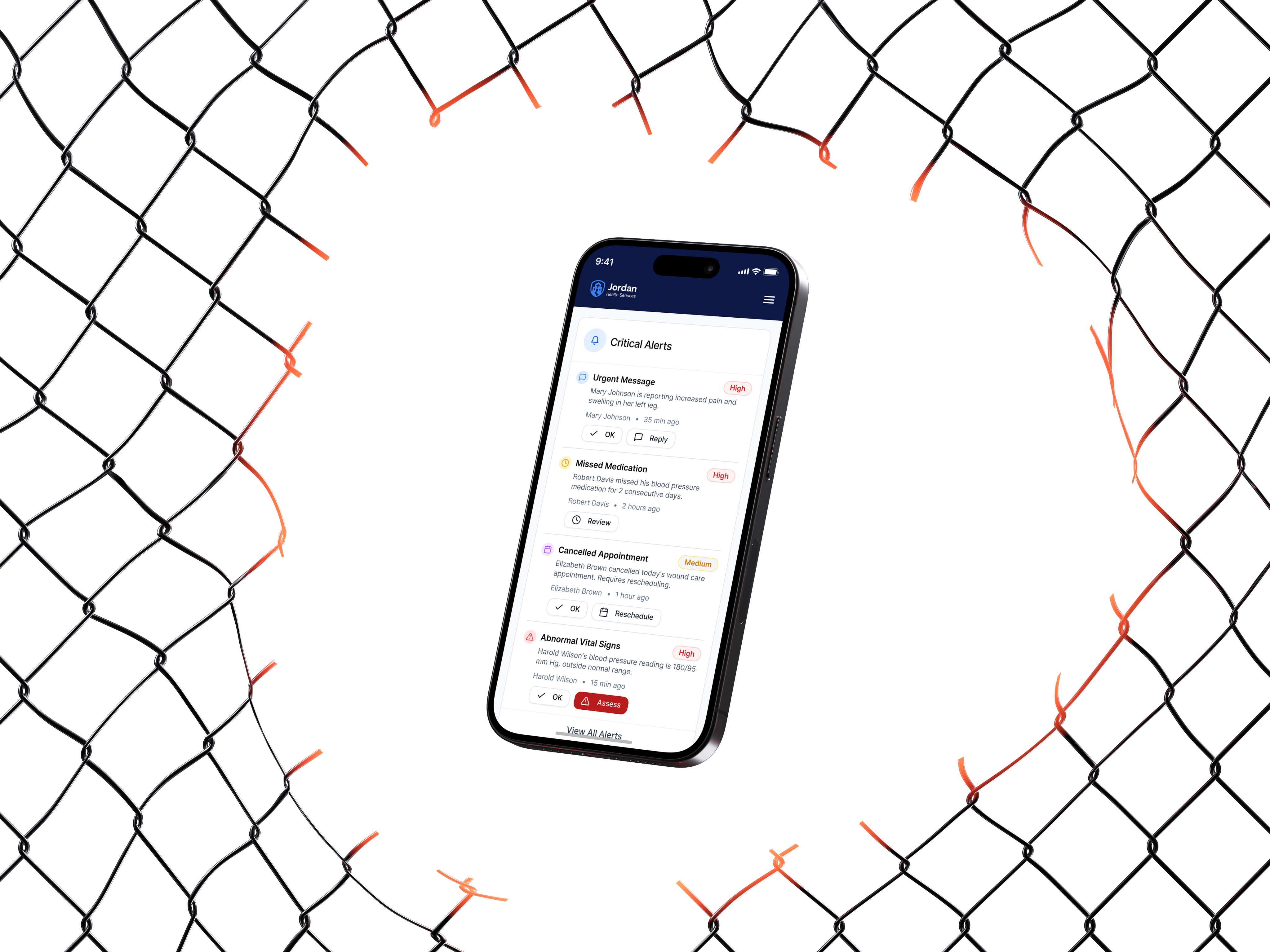
Patients
This redesigned patient view simplifies care coordination by organizing all patient statuses (active, inactive, critical, pending) into clearly labeled categories. Nurses and staff can now quickly assess, filter, and act on what matters most—without digging through cluttered lists.
Patient Status Cards
Quick Filters
Contact Shortcuts
Actionable Flags
Status-Based Sorting
Export/Import Options

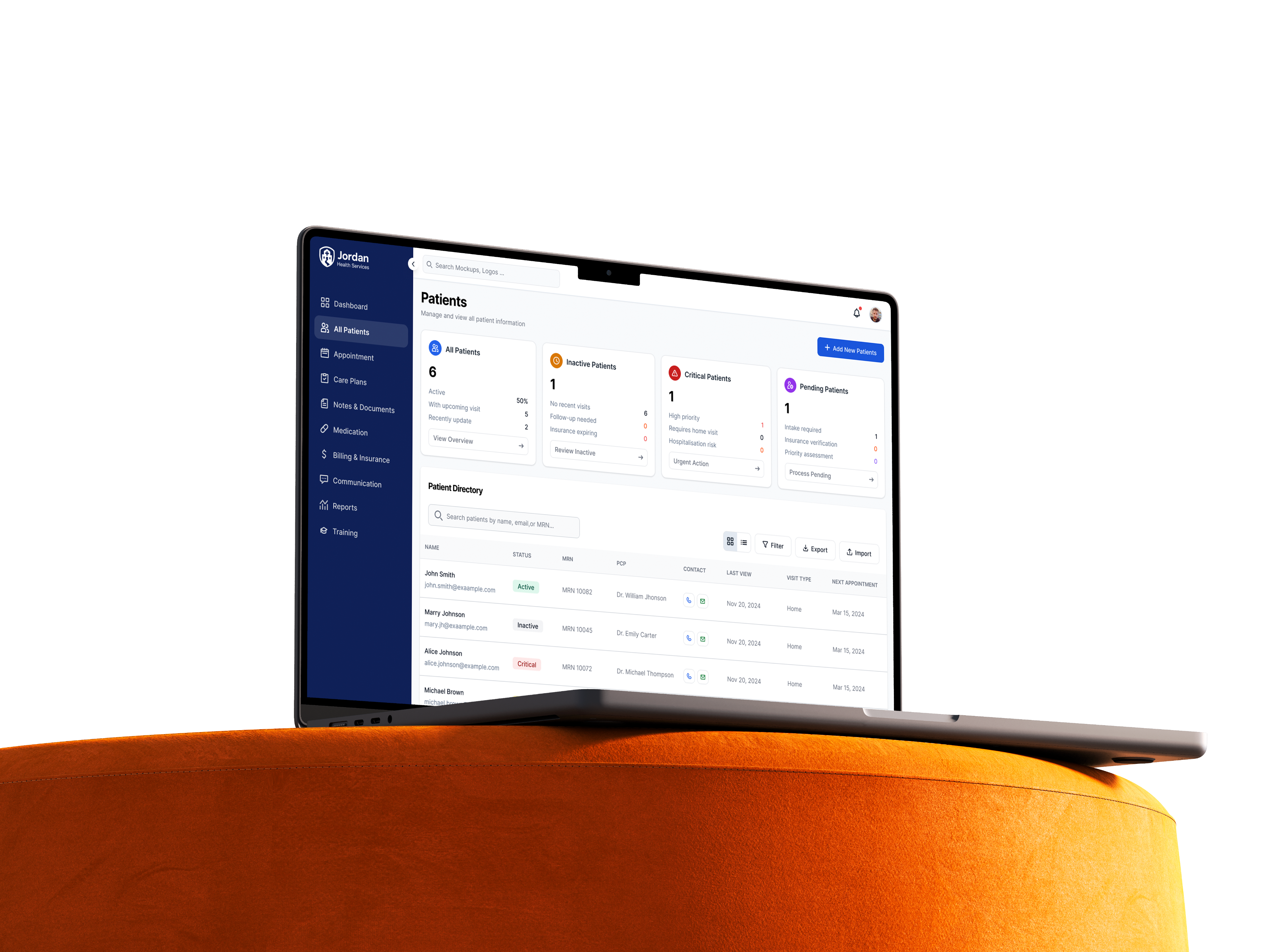
Appointment
The redesigned appointment screen brings together optimized routing, visit insights, and real-time urgency tracking. Nurses can plan their day with full visibility into patient needs, estimated travel time, and appointment types—all on one screen.
Route Optimization
Urgent Visit Flags
Schedule Summary
Visit Type Breakdown
Weather & Traffic Context
Smart Start Workflow
Navigation Shortcuts
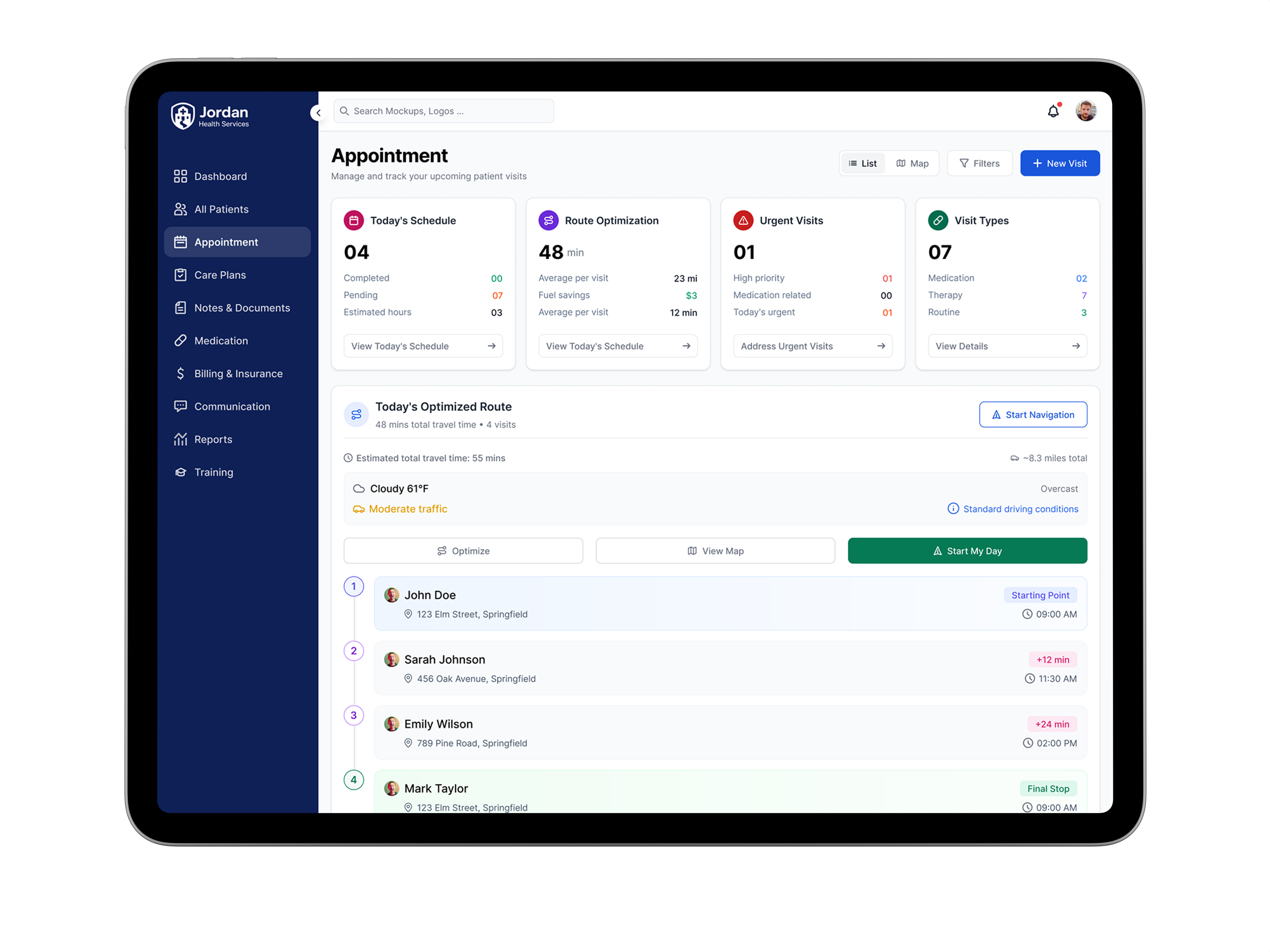
Today's Optimized Route
48 mins total travel time • 4 visits
Start Navigation
Estimated total travel time: 55 mins
~8.3 miles total
Cloudy
61°F
Overcast
Moderate traffic
Standard driving conditions
Optimize
View Map
Start My Day

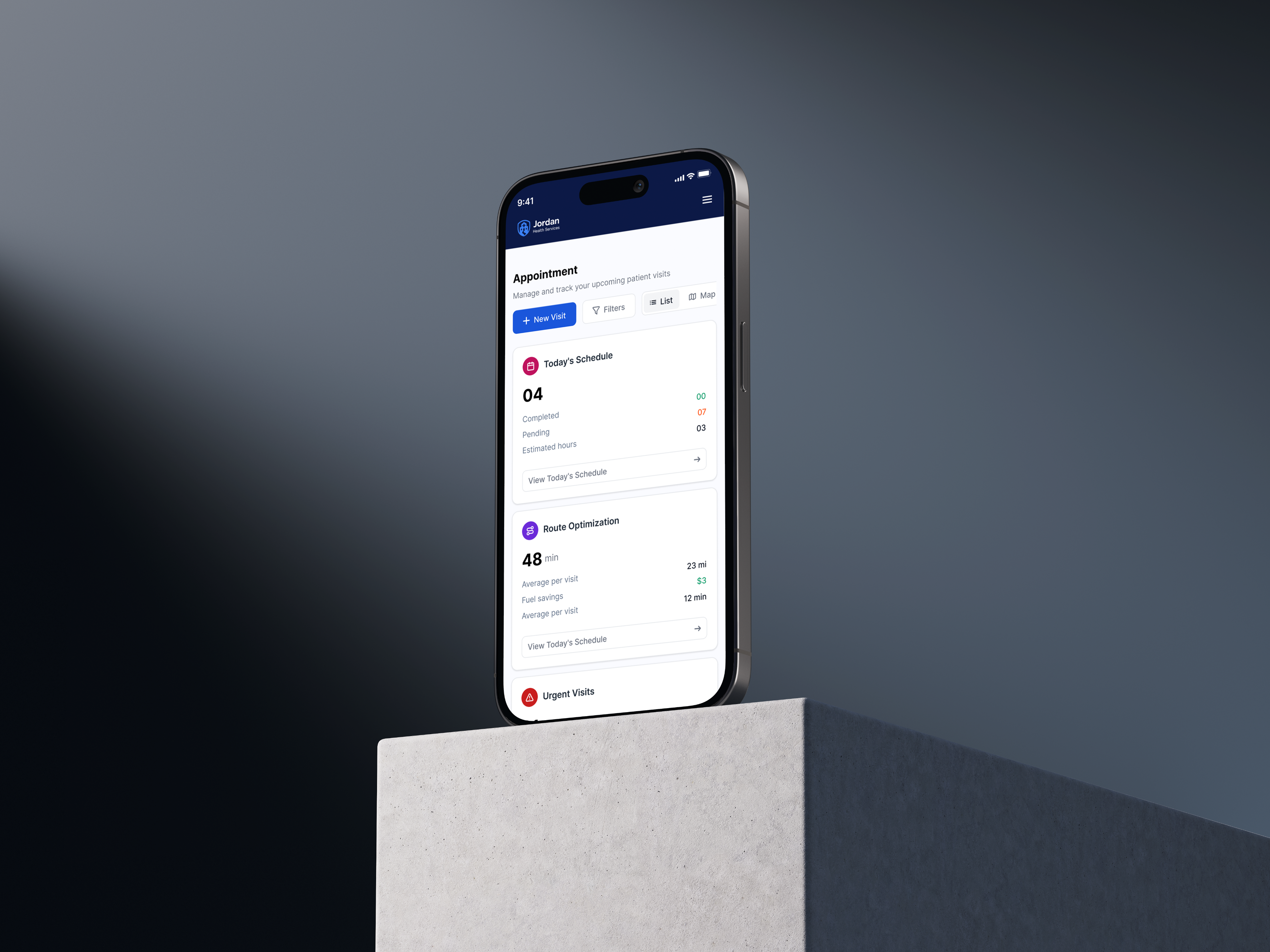
Care Plans
The redesigned appointment screen brings together optimized routing, visit insights, and real-time urgency tracking. Nurses can plan their day with full visibility into patient needs, estimated travel time, and appointment types—all on one screen.
Schedule Summary
Route Optimization
Urgent Visit Flags
Visit Type Breakdown
Weather & Traffic Context
Navigation Shortcuts
Smart Start Workflow
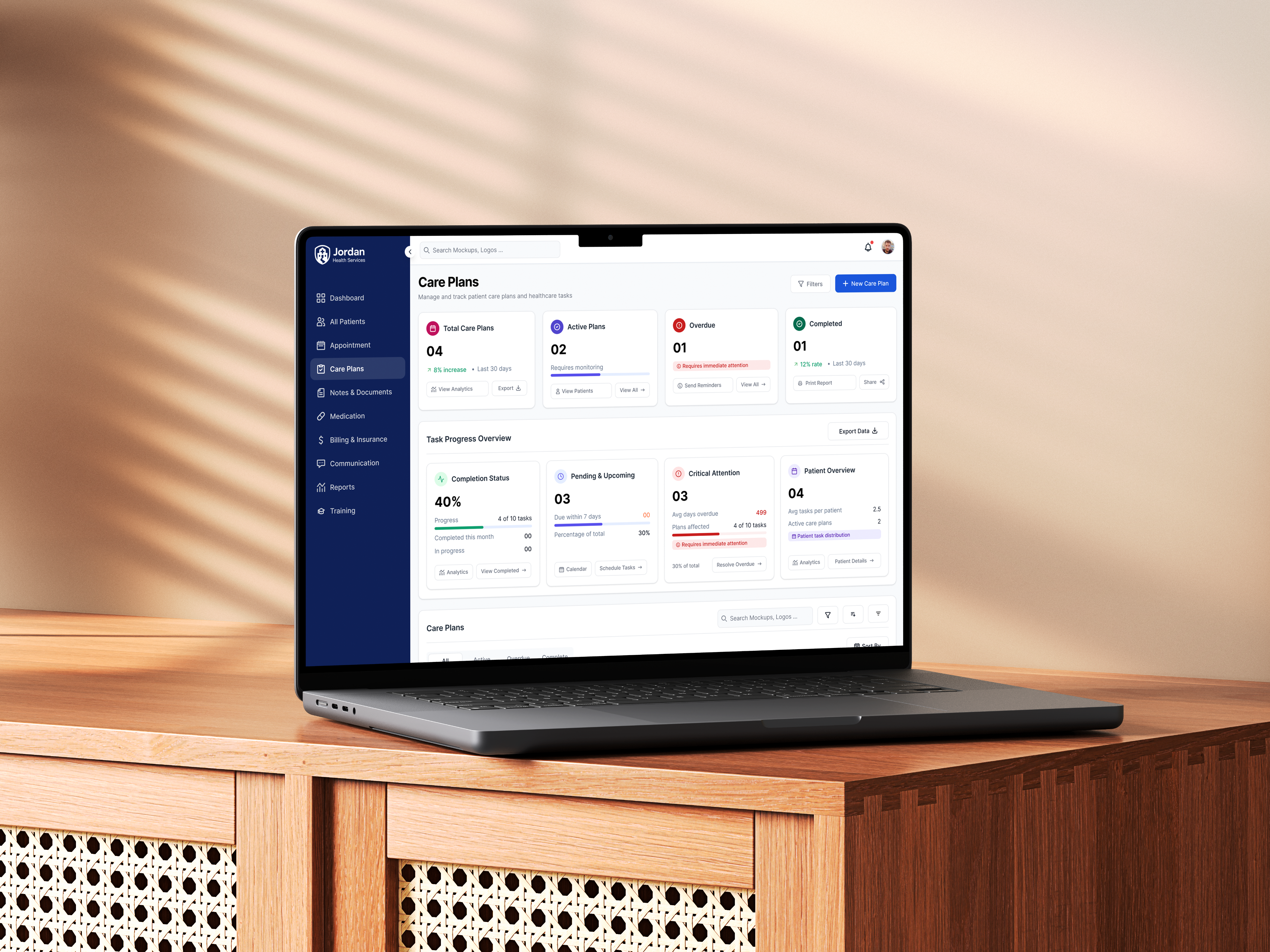

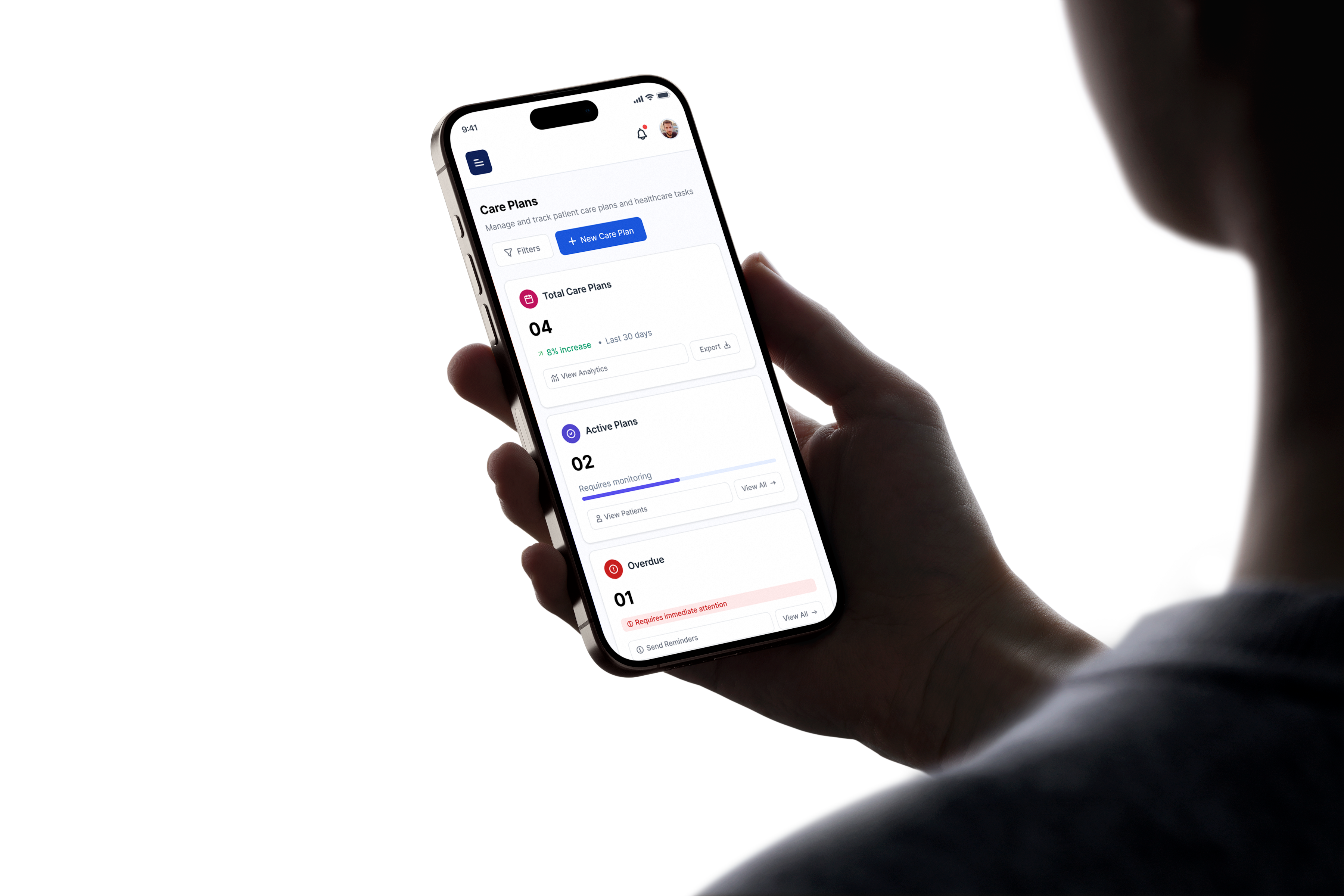
Usability Test
Visualizing the quantifiable improvements from our redesign across key metrics
Task Completion Results
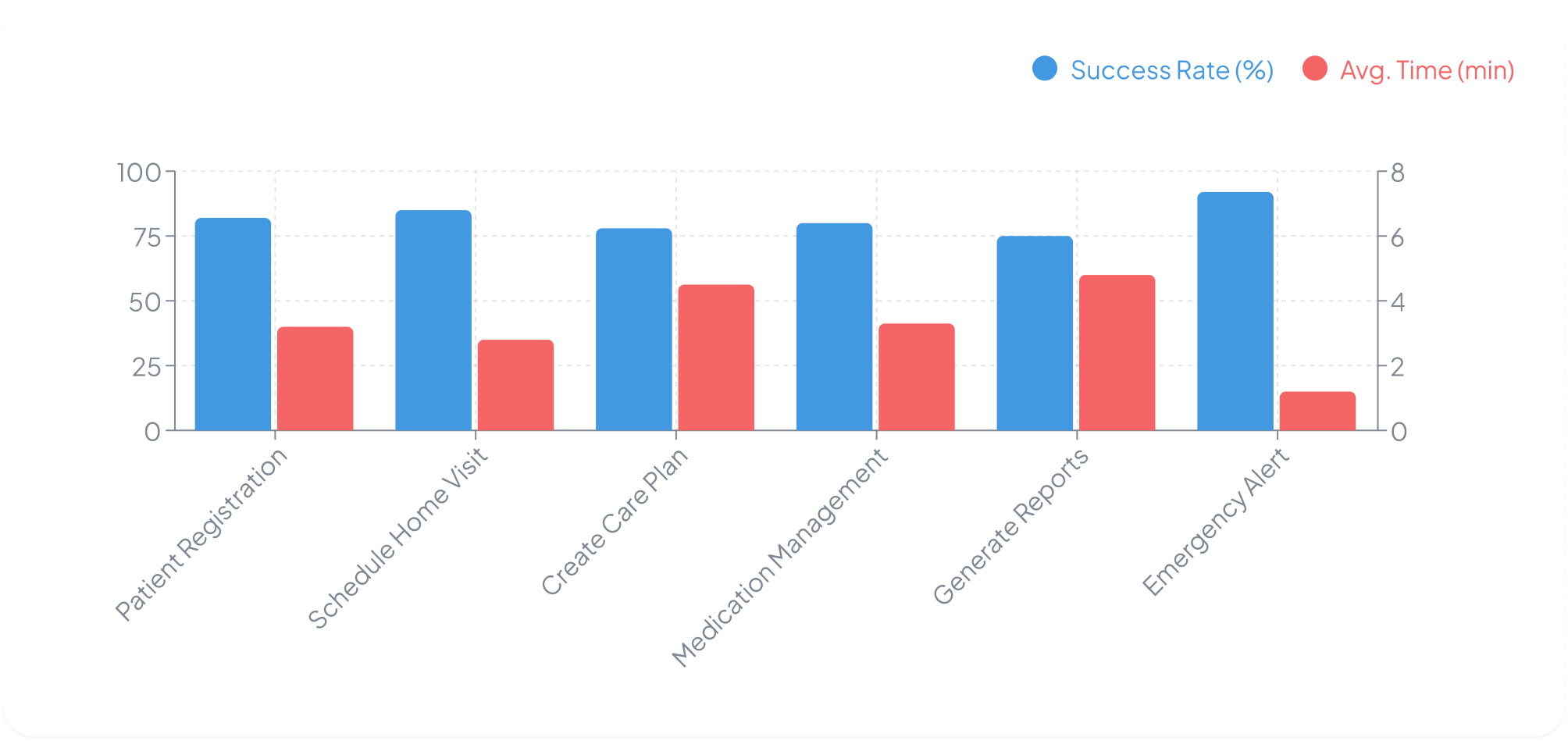
Participant Demographics
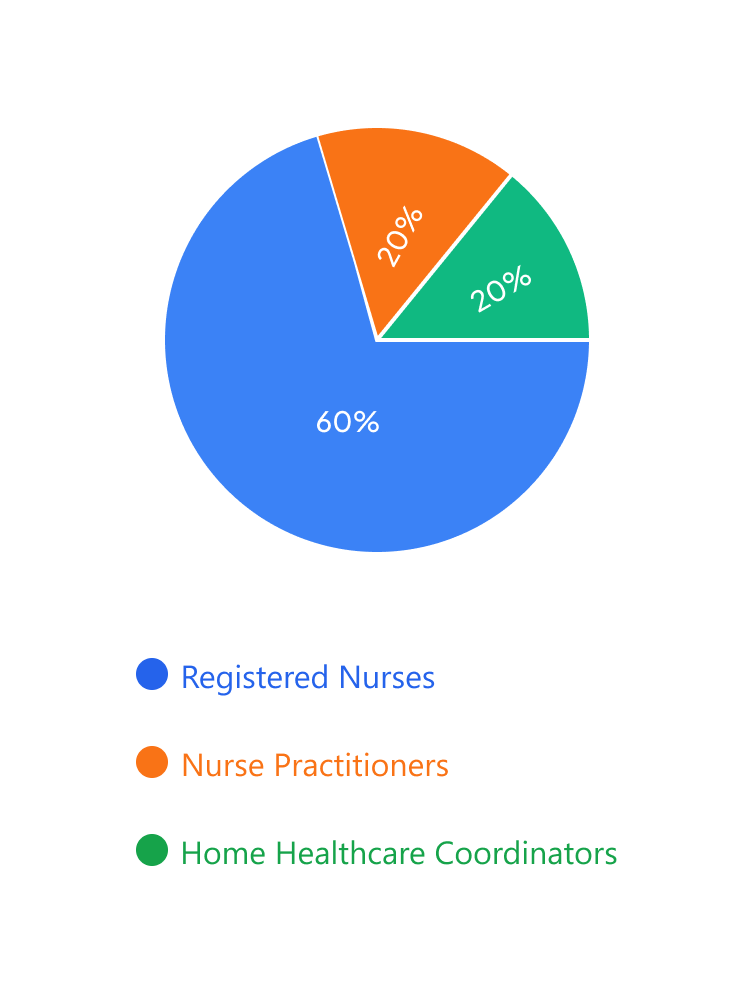
Task Completion Results
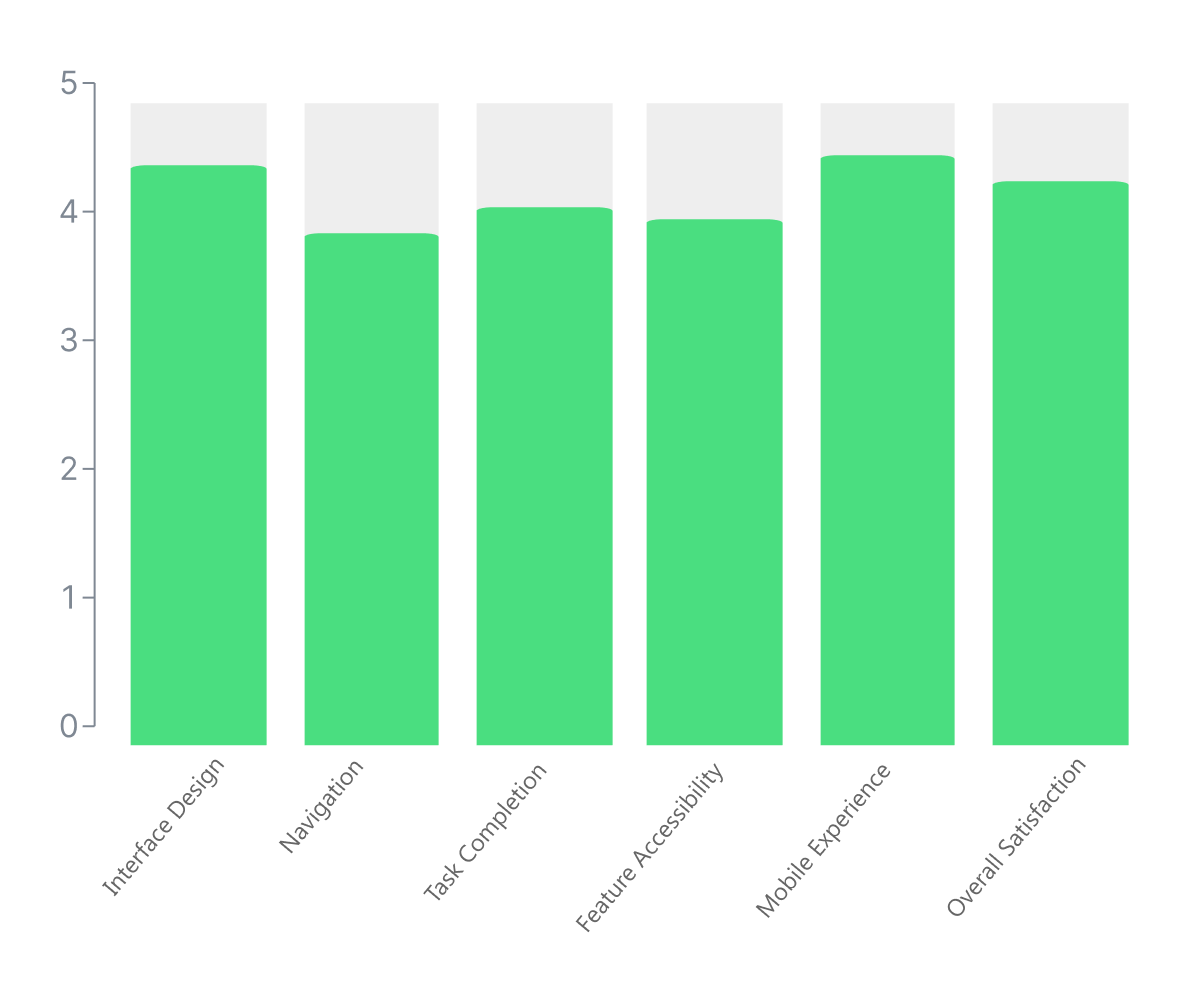
Impact Dashboard
Visualizing the quantifiable improvements from our redesign across key metrics
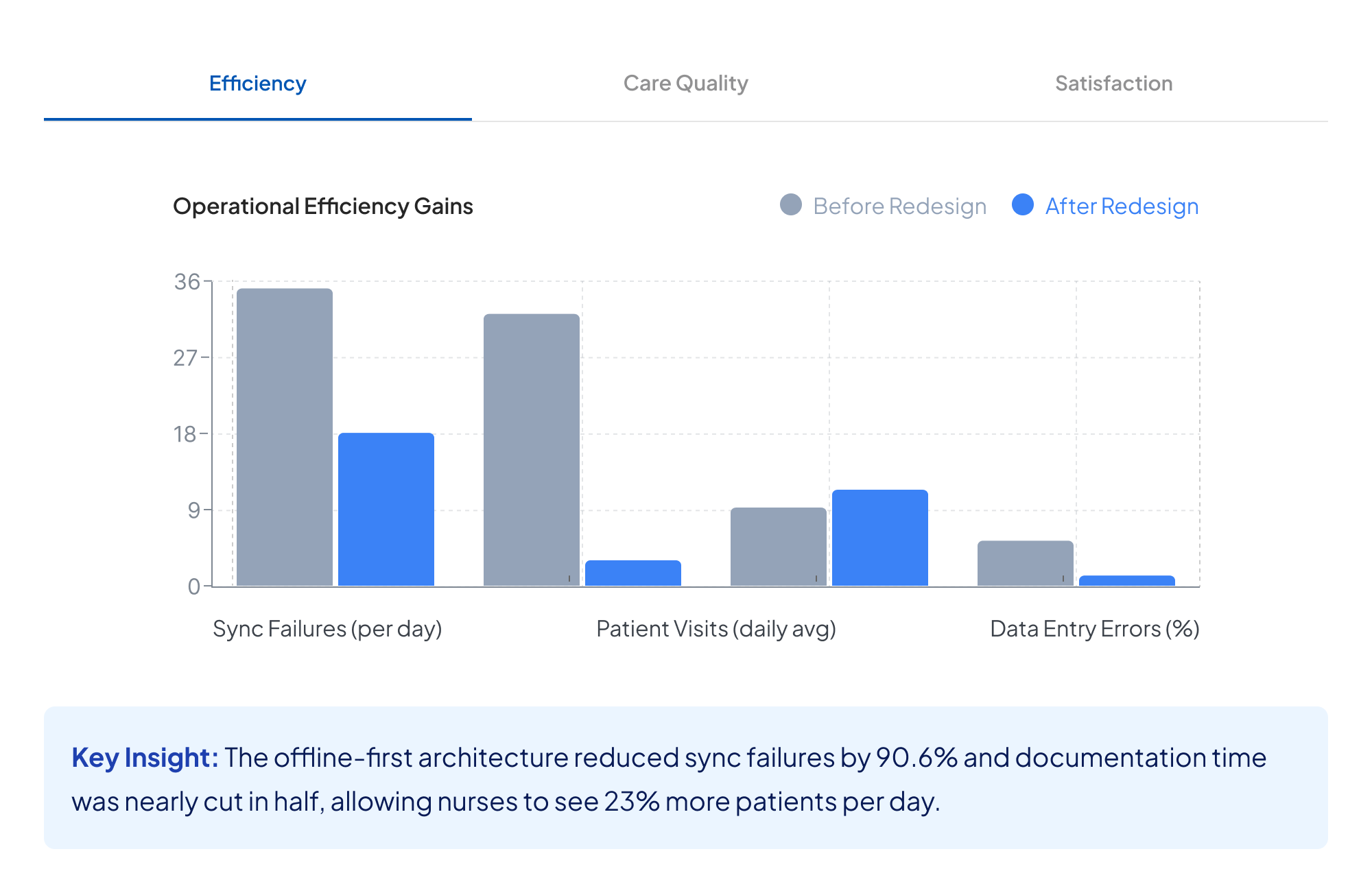
92%
User satisfaction rating from nurses and managers
45%
Reduction in documentation time per patient visit
20%
Increase in time spent directly with patients
Transforming Home Healthcare with Modern Mobile Solution



Project Overview
Jordan Health Services (JHS) is a provider of home healthcare solutions serving thousands of patients across multiple regions. Their legacy software—used by nurses to document visits and manage patient data—was becoming a barrier to effective care.
The goal was to create a cohesive platform that unified all critical tasks, offered offline support, reduced errors, and introduced new features to enhance patient care and staff satisfaction.
Role
UX Designer & Researcher
Team Size
+ 8 people
Duration
+ 9 Months
Business Type
B2B

Care Solution


Management
Outcome
Jordan Healthcare 1.0 (the original release) provided basic schedulin gand documentation but suffered from serious limitations during field use. The app didn't adequately address caregivers' needs for reliable offline functionality.

Redesign Impact
UX Design
UI Design
Offline Success Rate
96%
Design & Development Process
Our process focused on transforming a legacy system into an intuitive, offline-capable platform that serves diverse healthcare roles.
October 2024
Research & Discovery
Conducted user interviews, field observations, and workflow analysis with healthcare staff to understand pain points.
December 2024
Design Concepts & Low-Fidelity Prototypes
Created wireframes and low-fidelity prototypes for each user role, focusing on offline-first architecture.
February 2025
High-Fidelity Design & Prototyping
Refined designs based on user feedback and developed high- fidelity prototypes with offline functionality.
January 2025
User Testing & Feedback
Conducted usability testing sessions with nurses, managers, and family caregivers to validate initial designs.
March 2025
Development & Implementation
Developed the application with dedicated interfaces for each user role and robust offline synchronization.
April 2025
Beta Testing & Refinement
Conducted real-world testing with a pilot group of 25 nurses across various locations and connectivity scenarios.
May 2025
Launch & Adoption
Rolled out the solution to all 250+ staff members with comprehensive training and support resources.
November 2024
Analysis & Persona Development
Analyzed research data, created user personas, and developed journey maps to identify key opportunity areas.
Before & After Comparison
Jordan Healthcare 1.0 (the original release) provided basic schedulin gand documentation but suffered from serious limitations during field use. The app didn't adequately address caregivers' needs for reliable offline functionality.

Before
Desktop-only software requiring office returns
Frequent crashes and data loss during sync
Multiple separate systems causing confusion
No offline capability for rural visits
Limited SOS or emergency functionality

After
Desktop-only software requiring office returns
Frequent crashes and data loss during sync
Multiple separate systems causing confusion
No offline capability for rural visits
Limited SOS or emergency functionality
Research Approach
To deeply understand the challenges and needs of home healthcare providers and patients, we conducted extensive research using multiple methods.




Contextual Interviews
Interviewed 18 nurses, 6 nurse managers, and 12 family caregivers to understand their experiences.
Field Observations
Shadowed 8 nurses during home visits to observe real-world usage patterns and challenges in various environments
Workflow Analysis
Mapped and analyzed 5 key workflows to identify pain points, redundancies, and improvement opportunities
User Persona
We mapped the current journey of home healthcare nurses to identify pain points and opportunities for improvement.

Traveling Nurse
Mary Rodriguez
Location: Amman, Jordan
Age: 32 Years
Experience: 8 Years
Pain Points
Struggles with manual data entry during patient visits
Often loses data due to poor connectivity in rural areas
Finds the current system fragmented and difficult to navigate
Spends too much time on documentation vs. patient care
Limited visibility into schedule changes or urgent requests
Goals
Mobile solution that allows seamless offline data capture
Quick access to patient care plans and medical history
Simplified documentation that can be completed on-the-go
Immediate emergency support when needed in the field
Optimized routes to reduce travel time between visits
Research Insights
After analyzing interview data, field observations, and workflow analysis, we identified key insights that guided our design solutions.


🟢 NEED
High
Data Access for Multiple Providers
Patients often have multiple healthcare providers who need access to the same information but use different systems.
"It's frustrating when the visiting nurse doesn't know what medication changes the doctor made yesterday."
— Theresa, Family Caregiver
🔴 PAIN POINT
High
Offline Accessibility Issues
Nurses frequently lose access to patient data when they enter areas with no cellular or WiFi coverage.
"I dread going to rural homes because I know I won't have the information I need when I get there."
— Maria, Home Health Nurse
Affinity Mapping
We mapped the current journey of home healthcare nurses to identify pain points and opportunities for improvement.
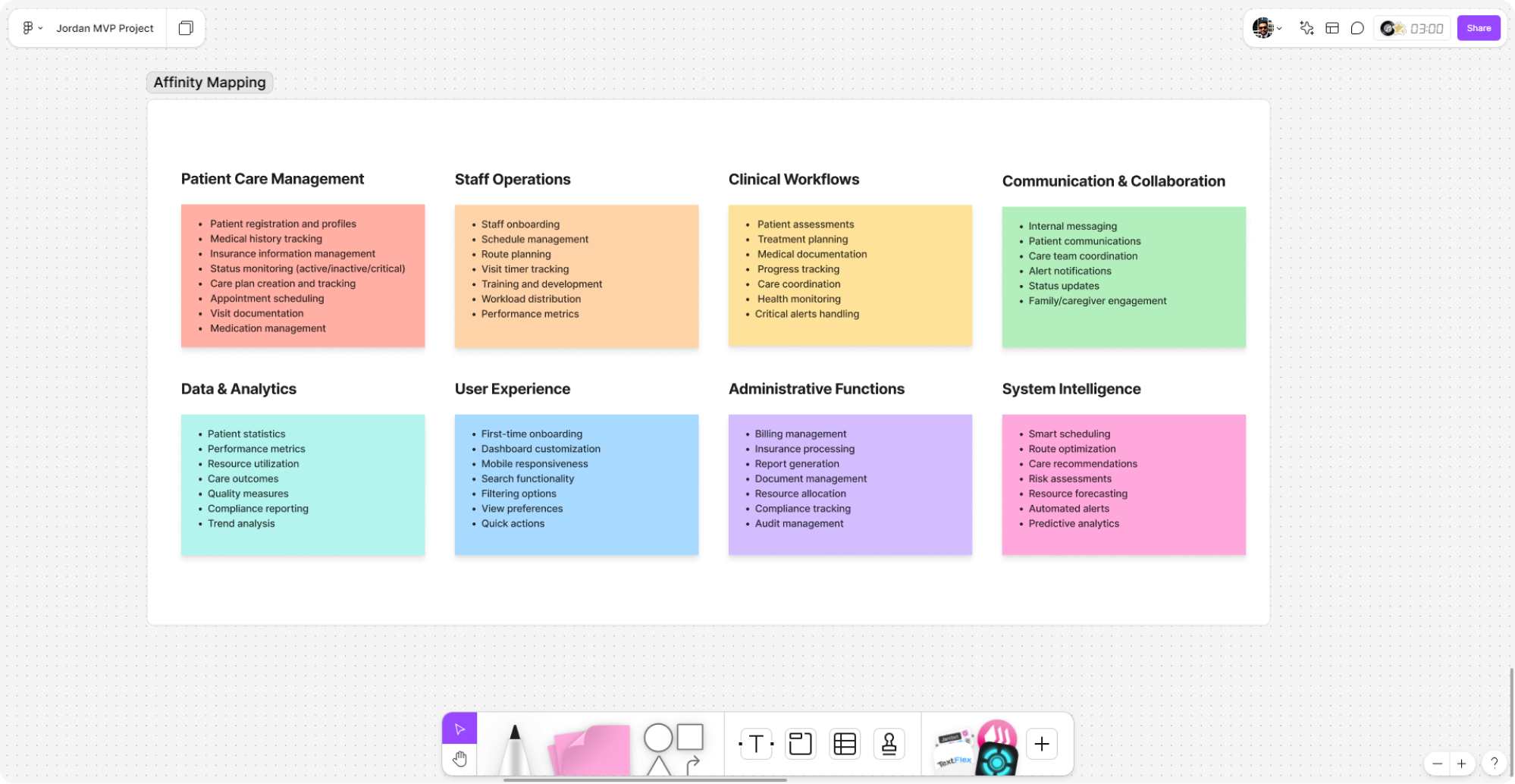
Journey Mapping
We mapped the current journey of home healthcare nurses to identify pain points and opportunities for improvement.

Heat mapping
We mapped the current journey of home healthcare nurses to identify pain points and opportunities for improvement.
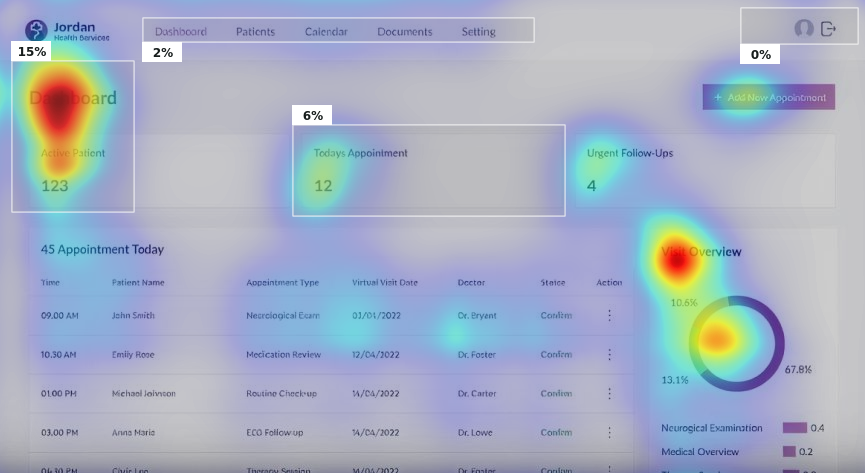
User Flow
We mapped the current journey of home healthcare nurses to identify pain points and opportunities for improvement.

Wireframes
We mapped the current journey of home healthcare nurses to identify pain points and opportunities for improvement.
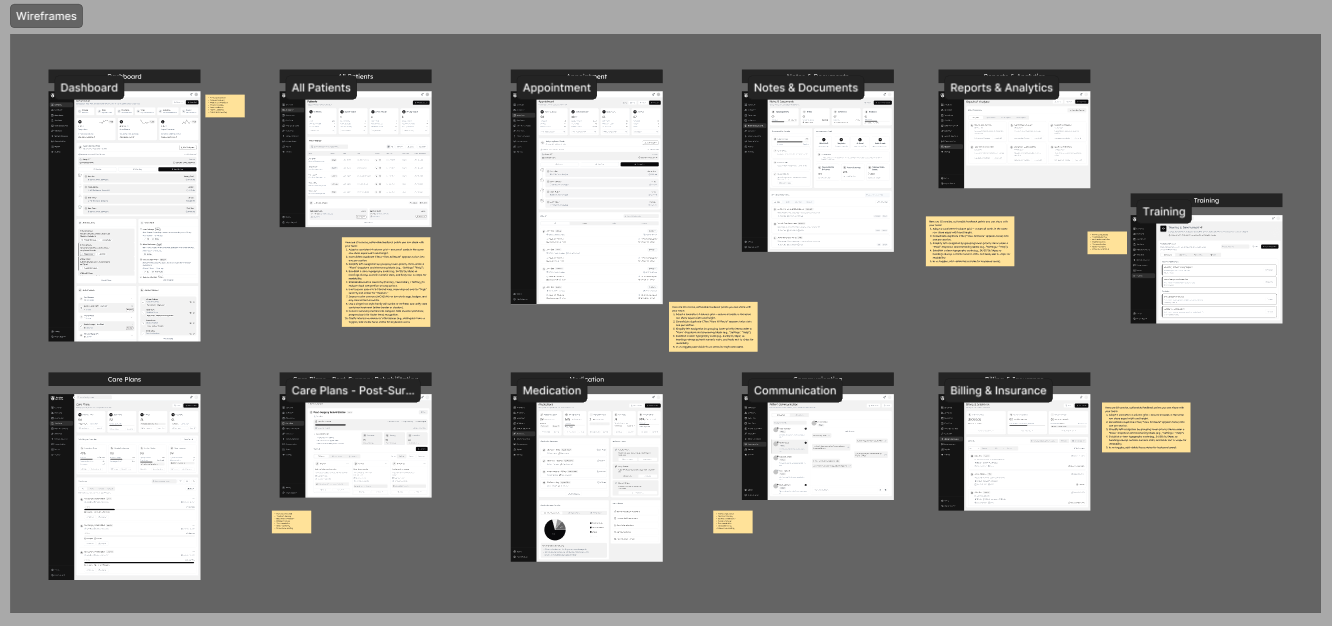
Accessibility Considerations (WCAG)
Ensuring inclusive designs by following the latest WCAG to make products usable for all.
Color Contrast
Text Legibility
Keyboard Navigation
Alternative Text
Screen Reader
Error Identification

Typography & Colors
Aa
Inter
A B C D E F G H I G K L M N O P Q R S T U V W X Y Z 1 2 3 4 5 6 A B C D E F G H I G K L M N O P Q R S T U V W X Y Z 0 ~@#^*&()+_/
Regular
Medium
Semi Bold
Bold
Sapphire.
HEX: #0F2057
Dodger Blue.
HEX: #1A56DB
White.
HEX: #FFFFFF
Nocturne.
HEX: #03030F
Collaboration with Developers
To deeply understand the challenges and needs of home healthcare providers and patients, we conducted extensive research using multiple methods.



Universal Component System
A modular and reusable component set designed to power multiple screens across the healthcare platform. This system includes dynamic widgets like visit summaries, smart route optimization, patient directories, care plans, and AI-powered documentation tools—ensuring consistency, scalability, and a seamless user experience throughout the product.
2%
8
Today's Visits
2 more than yesterday
View today's schedule
Today's Optimized Route
48 mins total travel time • 4 visits
Start Navigation
Estimated total travel time: 55 mins
~8.3 miles total
Cloudy
61°F
Overcast
Moderate traffic
Standard driving conditions
Optimize
View Map
Start My Day
Patient Directory
Search patients by name, email,or MRN...
Filter
Export
Import
Name
John Smith
john.smith@exaample.com
Marry Johnson
mary.jh@exaample.com
Alice Johnson
alice.johnson@example.com
Michael Brown
michael.brown@example.com
Emma Wilson
emma.wilson@example.com
status
Active
Inactive
Critical
Pendingg
Active
mrn
MRN 10082
MRN 10045
MRN 10072
MRN 10096
MRN 10015
pcp
Dr. William Jhonson
Dr. Emily Carter
Dr. Michael Thompson
Dr. Sarah Mitchell
Dr. David Anderson
contact
last view
Nov 20, 2024
Nov 20, 2024
Nov 20, 2024
Nov 20, 2024
Nov 20, 2024
visit type
Home
Home
Home
Home
Home
next appointment
Mar 15, 2024
Mar 15, 2024
Mar 15, 2024
Mar 15, 2024
Mar 15, 2024
Documentation Tools
Quick Draft
Fast note creation
Templates
Standardized formats
AI Assist
Smart documentation
Batch Create
Multiple notes at once
Pending
Knee flexion exercise
Guide through 10 knee flexion
exercises, 3 sets
Due: Nov 7, 2023
Assigned to: staff-003
Task due today - high priority
Details
Complete
1
2
3
4
5
6
7
Search ...

Schedule link
Visits Numbers
Today's Visits Grow
Quick Draft icon
Map Start Navigation Button
Task Pending
Task Due Date
Assigned Task Number
Task Details Button
Search patients
Care Plans
Timeline Process
Date End
Profile Avatar
Notification
Any Search Bar
Care Plans Edit Button
Patient Name
Patient Email
Patient Name
Patient Status
Doctor Name
Contact Info
Doctor Visit Status
Quick Action Button
Templates Tools
Smart AI Assist Documentation
Multiple notes at once Batch Create Icon
Map View
Car Moderate traffic
Time Label
Weather
Post-Surgery Rehabilitation
active
Edit
John Doe
Care Plan Timeline
- 521 days elapsed
- 0 days remaining
- 100% Complete
Started: Oct 15, 2023
End: 15/12/2023
Dashboard
The new Dashboard Overview for Jordan Health Services is designed specifically for nurses and caregivers who conduct home visits. It offers a consolidated, real-time view of daily visits, route planning, patient alerts, and medication tracking—all in one accessible, responsive layout. This redesign aims to reduce cognitive load, minimize manual effort, and empower healthcare professionals with smarter tools to make informed decisions on the go.
By focusing on contextual information, efficiency-driven actions, and real-world constraints like weather, traffic, and medication alerts, the dashboard becomes a practical command center that enhances patient care and nurse productivity.
Route Optimization
Smart Start Button
Critical Alerts
Medication Actions
Supply Monitoring
Daily KPIs
Clean Layout
Mobile-First Design





Patients
This redesigned patient view simplifies care coordination by organizing all patient statuses (active, inactive, critical, pending) into clearly labeled categories. Nurses and staff can now quickly assess, filter, and act on what matters most—without digging through cluttered lists.
Patient Status Cards
Quick Filters
Contact Shortcuts
Status-Based Sorting
Actionable Flags
Export/Import Options

Appointment
The redesigned appointment screen brings together optimized routing, visit insights, and real-time urgency tracking. Nurses can plan their day with full visibility into patient needs, estimated travel time, and appointment types—all on one screen.
Schedule Summary
Route Optimization
Urgent Visit Flags
Visit Type Breakdown
Weather & Traffic Context
Navigation Shortcuts
Smart Start Workflow

Today's Optimized Route
48 mins total travel time • 4 visits
Start Navigation
Estimated total travel time: 55 mins
~8.3 miles total
Cloudy
61°F
Overcast
Moderate traffic
Standard driving conditions
Optimize
View Map
Start My Day

Care Plans
The redesigned appointment screen brings together optimized routing, visit insights, and real-time urgency tracking. Nurses can plan their day with full visibility into patient needs, estimated travel time, and appointment types—all on one screen.
Schedule Summary
Route Optimization
Urgent Visit Flags
Visit Type Breakdown
Weather & Traffic Context
Navigation Shortcuts
Smart Start Workflow



Usability Test
Visualizing the quantifiable improvements from our redesign across key metrics
Task Completion Results
Success Rate (%)
Avg. Time (min)
Patient Registration
Schedule Home Visit
Create Care Plan
Medication Management
Generate Reports
Emergency Alert
0
25
50
75
100
0
2
4
6
8
Participant Demographics
60%
20%
20%
Registered Nurses
Nurse Practitioners
Home Healthcare Coordinators
Task Completion Results
0
1
2
3
4
5
Interface Design
Navigation
Task Completion
Feature Accessibility
Mobile Experience
Overall Satisfaction
Impact Dashboard
Visualizing the quantifiable improvements from our redesign across key metrics
Efficiency
Care Quality
Satisfaction
Operational Efficiency Gains
Before Redesign
After Redesign
36
27
18
9
0
Sync Failures (per day)
Patient Visits (daily avg)
Data Entry Errors (%)
Key Insight: The offline-first architecture reduced sync failures by 90.6% and documentation time was nearly cut in half, allowing nurses to see 23% more patients per day.
92%
User satisfaction rating from nurses and managers
45%
Reduction in documentation time per patient visit
20%
Increase in time spent directly with patients